ROAD TO PARIS
WHERE EVERY VOICE MATTERS

Legends of Generosity: African Footballers Who Give Back



Legends of Generosity: African Footballers Who Give Back

The Inspirational Journey of Kenyan Equestrian,
Neocolonialism, inequality, and exploitation that continue to shape the dynamics between France and its former colonies.
Earthen Elegance: The Timeless Legacy of African Clay Pots WHERE EVERY VOICE MATTERS
Self Care
Homemade Energy Drinks for Natural Vitality
Women voice Road to Paris
The Inspirational Journey of Kenyan Equestrian,
“Long overdue:Tanzania’s quest for Olympics medal

As I pen these words, my heart swells with gratitude for the journey we’ve embarked upon together through the pages of People of Africa magazine, in this special issue focusing on The Road to the Paris Olympics 2024 It has been a voyage of profound discovery, one that has deepened my love for Africa the land where I drew my first breath, where my roots intertwine with the soil beneath our feet.
The echoes of history, etched in the annals of the 1884 Berlin Conference, remind us of the wounds inflicted upon our continent, scars that still linger in the fabric of our collective memory
Yet, amidst the shadows of division, I stand firm in my conviction: it is not over until it is over. The time for Africa to rise as one is upon us; where once they sought to divide us, we shall unite in Paris, France, in 2024.
Dear Africans, let us heed the call to unity, to mend the fractures left by the tumultuous currents of history. Together, as a unified force, with one voice and one purpose, we shall emerge as a beacon of strength and resilience, illuminating the path towards a brighter tomorrow. Africa, let us declare with unwavering certainty: Africa is for Africans.

ThetimeforAfricato riseasoneisuponus; whereoncethey soughttodivideus,we shalluniteinParis, France,in2024.
In this moment of unity, People of Africa magazine wishes to extend our heartfelt support and admiration to all the athletes who will proudly fly the African flag high at the Paris Olympics 2024. We are immensely proud of you, and we wish you all the best. Bring home the gold medals and make Africa shine with pride. The continent eagerly awaits your triumphant return. My beloved brothers and sisters, your presence throughout this journey has been a source of immeasurable joy and inspiration. Your openness to embrace the beauty and diversity of Africa’s narrative fills my heart with pride From the northern winds to the southern plains, from the eastern sunrises to the western shores, Africa’s magnificence knows no bounds. As we bid farewell to these pages, may the stories they contain resonate within your soul, igniting a flame of curiosity, empathy, and reverence for the continent we call home. May you carry forth the essence of these pages, spreading its message of unity, appreciation, and celebration of Africa’s enduring spirit.
In closing, I extend my deepest gratitude to you, dear reader, for embarking on this journey with me Thank you for allowing me to share our love for Africa with you, and may our connection to this remarkable continent continue to enrich our lives, inspiring us to embrace its beauty and diversity with open arms.
With heartfelt thanks,,
HoneymoonAljabri Chief Editor, People of AfricaWHERE EVERY VOICE MATTERS.

In the grand theater of global politics, Africa has long been cast as the tragic protagonist, ensnared in a web of Western avarice and exploitation. From the shameless carving up of its territories in 1884 to the present day, the continent has endured a relentless onslaught of interference and control.
Let’s not mince words here: the notion of “Africa for Africans”; has become little more than a hollow mantra, drowned out by the cacophony of Western agendas. Just take a glance at the history books, where the tales of Lumumba, Sankara, and Gaddafi serve as cautionary tales of defiance met with brutal retribution. It’s a script written by the West, where any leader daring to prioritize Africa’s interests is swiftly silenced.
And let’s not pretend that Africa has a seat at the table in the United Nations. With no veto power and a voice that falls on deaf ears, the continent is little more than a pawn in the grand chess game of geopolitics. Recent admissions from U.S. senators only confirm what we already know: Western powers see Africa as nothing more than a playground for their own ambitions.
Behind the thin veil of development aid lies a harsh reality: Africa is a cash cow for the West, milked dry by military bases and puppet regimes propped up to serve foreign interests. The West’s insatiable appetite for Africa’s resources knows no bounds, with no regard for the lives and livelihoods left in its wake. As the world watches on, Africa’s struggle for self-determination rages on, a symbol of resilience in the face of oppression. It’s time for the West to heed the wake-up call: Africa will no longer be shackled by greed and exploitation The continent’s voice will be heard, its sovereignty respected. Until then, the fight continues, fueled by the fiery spirit of a continent that refuses to be silenced.

Neocolonialism, inequality, and exploitation that continue to shape the dynamics between France and its former colonies.
This quote by Muammar Gaddafi is often cited in discussions about his pan-Africanist views and advocacy for African self-reliance. However, pinpointing the exact date or occasion when he said this specific statement can be challenging, as Gaddafi spoke on various occasions throughout his political career spanning several decades. It’s likely that he expressed similar sentiments multiple times over the years, emphasizing his belief in African unity and independence. Yes, several African leaders have echoed similar sentiments about African ownership and self-determination. While not all may have used the exact phrase “Africa is for Africans” many have expressed similar ideas about the need for Africans to take control of their own destinies and resources. Some notable leaders who have advocated for African unity and selfreliance include:
1. Kwame Nkrumah: The first President of Ghana and a prominent pan-Africanist leader, Nkrumah emphasized the importance of African solidarity and self-determination. He famously said, “The independence of Ghana is meaningless unless it is linked up with the total liberation of the African continent.”
2. Julius Nyerere: The first President of Tanzania, Nyerere was a staunch advocate for African socialism and self-reliance. He promoted the concept of Ujamaa, or family hood, as a guiding principle for African development. Nyerere emphasized the need for Africans to work together to overcome colonial legacies and build a better future for themselves.
3. Patrice Lumumba: The first Prime Minister of the Democratic Republic of the Congo, Lumumba was a passionate advocate for African independence and unity. He famously declared, “We are not alone. Africa, Asia, and free and liberated people from every corner of the world will always be found at the side of the Congolese.” Africafuture:WillGlobal powerspullthestrings?
4. Thomas Sankara: The President of Burkina Faso from 1983 to 1987, Sankara was known as the “African Che Guevara” for his revolutionary socialist policies and commitment to African self-reliance. He advocated for African countries to break free from dependence on foreign aid and to prioritize the development of their own resources.
These leaders, among others, played significant roles in shaping the pan-Africanist movement and advocating for African sovereignty, unity, and self-determination. While they may not have used the exact phrase “Africa is for Africans,” their actions and words reflected a shared commitment to empowering African people and nations. The Berlin Conference of 1884-1885, also known as the Congo Conference or West Africa Conference, was a significant diplomatic event that aimed to regulate European colonization and trade in Africa during the late 19th century. The primary purpose of the conference was to establish rules and guidelines for the colonization and partitioning of Africa among European powers, in order to prevent conflicts and disputes over territory.
The conference attendees were representatives from 14 European countries, as well as the United States, who convened in Berlin, Germany, under the leadership of German Chancellor Otto von Bismarck. Some of the key European powers present at the conference included Great Britain, France, Germany, Portugal, Italy, Belgium, Spain, and the Netherlands.
The Berlin Conference resulted in the signing of the Berlin Act, which laid out guidelines for European colonization in Africa. These guidelines included principles such as the recognition of effective occupation and control over territory, respect for free trade and navigation on African rivers, and the prohibition of the slave trade.
However, the conference disregarded African perspectives and sovereignty, leading to the arbitrary drawing of colonial boundaries that often disregarded ethnic, cultural, and linguistic divisions within Africa.

Overall, the Berlin Conference played a crucial role in shaping the colonial map of Africa and laying the groundwork for European imperialism on the continent, with far-reaching consequences for African societies and their subsequent struggle for independence. The relationship between Westerns and its former colonial countries is complex and multifaceted, shaped by historical, political, economic, and cultural factors. While each former colony has its unique dynamics with West, there are some overarching themes and characteristics that define this relationship:
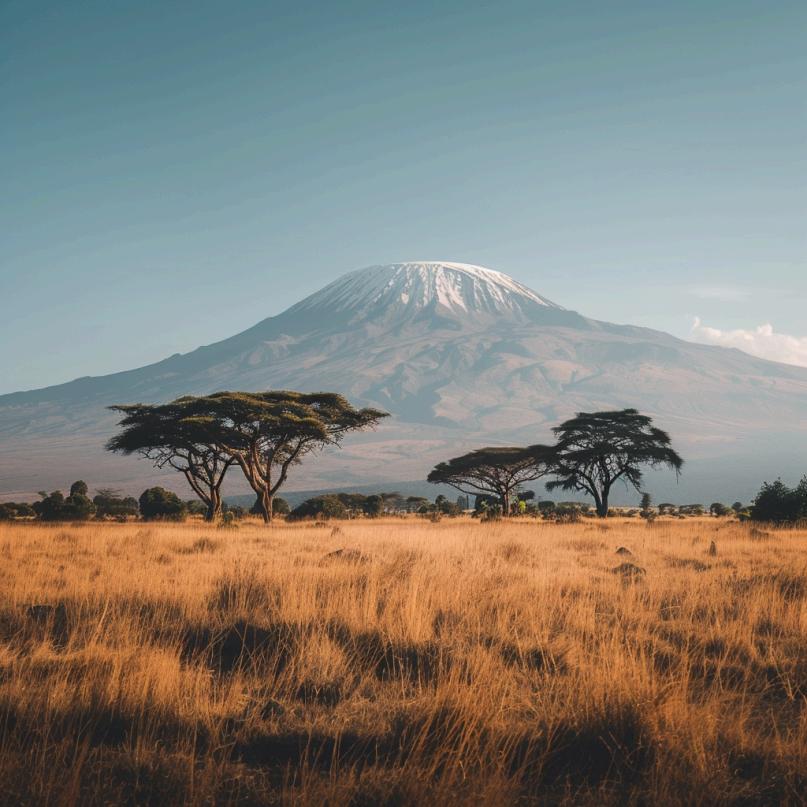




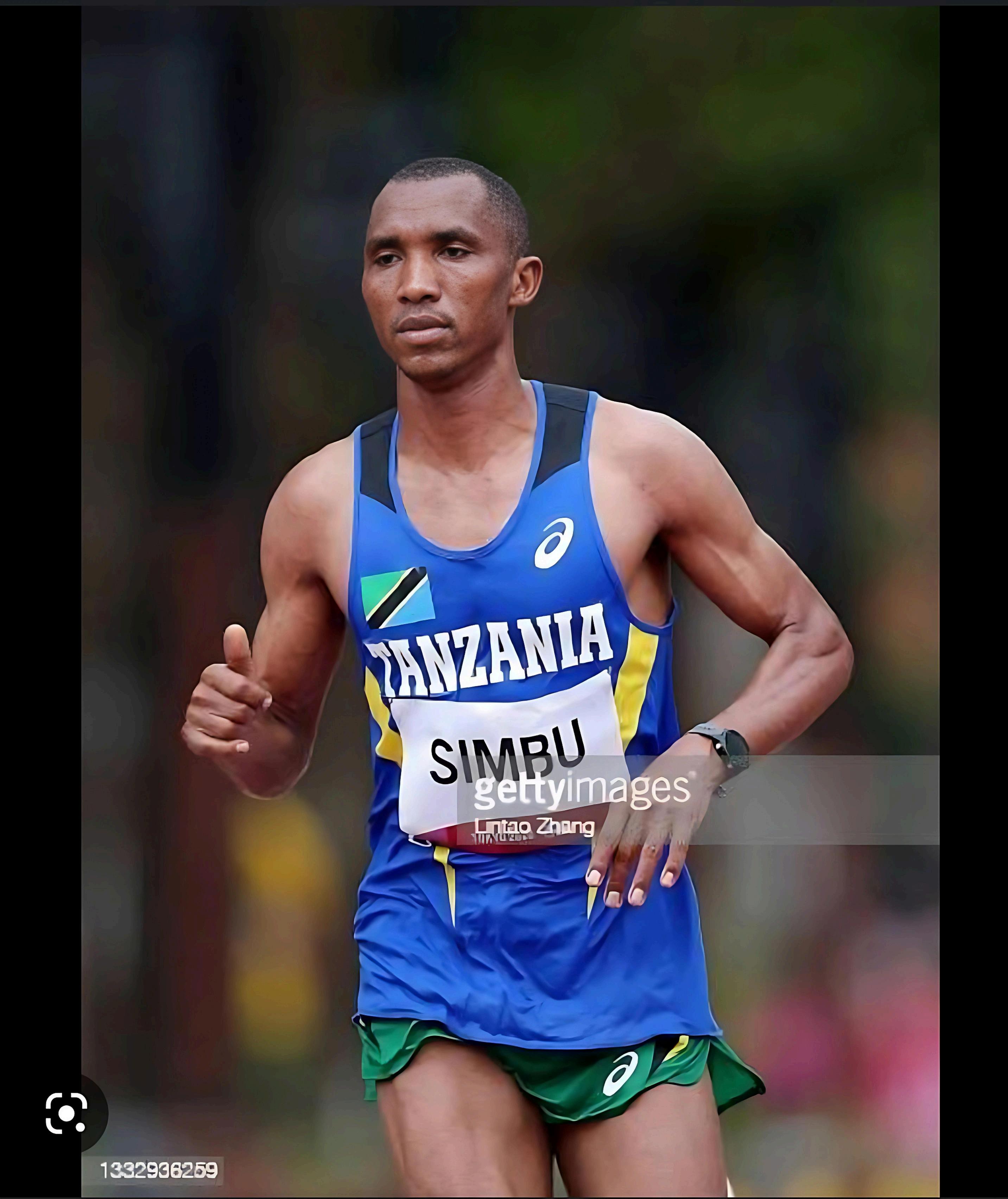
In the grand symphony of long-distance running, where the resounding beats of Kenyan andEthiopian dominance often take center stage, emerges a shining star from the serene landscapes of Tanzania: Alphonce Felix Simbu. Decorated with a silver medal from the Commonwealth Games in Birmingham and a resplendent gold triumph at the esteemed Mumbai Marathon, Simbu’s journey is nothing short of a testament to the unwavering spirit of African athletics.
Hailing from the rustic precincts of the Singida Region’s Igongi District, Simbu’s ascent from obscurity to eminence mirrors Africa’s rich tapestry of hidden talent yearning to be unearthed.
His introduction to the world of running was serendipitous, initially a mere dalliance that blossomed into an unwavering passion. It was under the tutelage of Mr. Madai Jambau that Simbu’s innate potential found its guiding light, shaping him into the formidable athlete revered today.
Amidst the tranquil routine of his training regimen, Simbu’s discipline remains unwavering. From the pre-dawn awakening to savoring a quintessentially Tanzanian breakfast of tea, bread, eggs, and chicken soup, his adherence to simplicity is his anchor in the whirlwind of competition.
I After
nourishing his body, he embarks on a rigorous routine, commencing with a brisk 30-minute run before delving into the rigorous drills at the gym, each movement meticulously crafted under the discerning eye of his coach. nourishing his body, he embarks on a rigorous routine, commencing with a brisk 30-minute run before delving into the rigorous drills at the gym, each movement meticulously crafted under the discerning eye of his coach.
“I refuse to be discounted”

Despite his yet-to-be-realized Olympic aspirations, Simbu’s focus remains resolute on delivering his utmost at the upcoming Paris Games. Undeterred by near misses in Rio and London, where he narrowly clinched fifth and seventh positions respectively, Simbu’s determination burns brighter than ever. “I refuse to be discounted” he proclaims with unwavering resolve. Paris presents an opportunity to bestow upon my country a medal of pride. “Long overdue:Tanzania’s quest for Olympics medal “ I t’s about time for Tanzania’s flag to shine” he asserts, his voice reverberating with a blend of determination and optimism.
As Simbu refines his craft amidst the awe-inspiring vistas of Arusha, his encounters with the legendary Kenyan and Ethiopian runners serve not only as inspiration but as a reminder of the unity fostered by their shared passion.
Running alongside my East African brethren is akin to a symphony of unity, he explains, his laughter echoing across the training grounds. We may hail from different nations, but our shared pursuit of excellence unites us, he emphasizes, underscoring the camaraderie that transcends borders.
“We may hail from different nations, but our shared pursuit of excellence unites us, he emphasizes, underscoring the camaraderie that transcends borders”
In homage to Africa’s storied Olympic legacy, Simbu pays tribute to the trailblazers who paved the way for generations to come. From Abebe Bikila’s iconic barefoot victory in the 1960 Rome Olympics to Haile Gebrselassie’s unparalleled dominance in the 10,000 meters, Africa’s imprinton the Olympic stage is indelible.
The ethos of Tanzanian marathon runners, Simbu elucidates, is encapsulated in the maxim: Our country doesn’t send us to start the marathon; our country sends us to finish it. A sentiment immortalized by the indomitable spirit of Stephen Akwari, whose valiant finish in the Mexico Olympics amidst adversity continues to inspire generations.

As the Paris Olympics beckon, Simbu exudes confidence in Africa’s collective prowess. It’s a watershed moment for African athletes, he asserts, his voice resonating with conviction. With our rich tapestry of talent and resilience, we are poised to leave an indelible mark on the global stage, he affirms, embodying the spirit of hope and possibility.
When asked what Africa means to him, Simbu’s response is unequivocal: “Africa is home, the cradle of our aspirations and the wellspring of our collective heritage” he states, his voice infused with reverence and pride. As the People of Afric, magazine, we extend our heartfelt wishes to Simbu and all aspiring athletes, urging them to embrace the legacy of those who came before them and forge ahead with courage and determination. For in their endeavors lies the promise of a brighter tomorrow, where the colors of Africa shine brightly on the global stage.

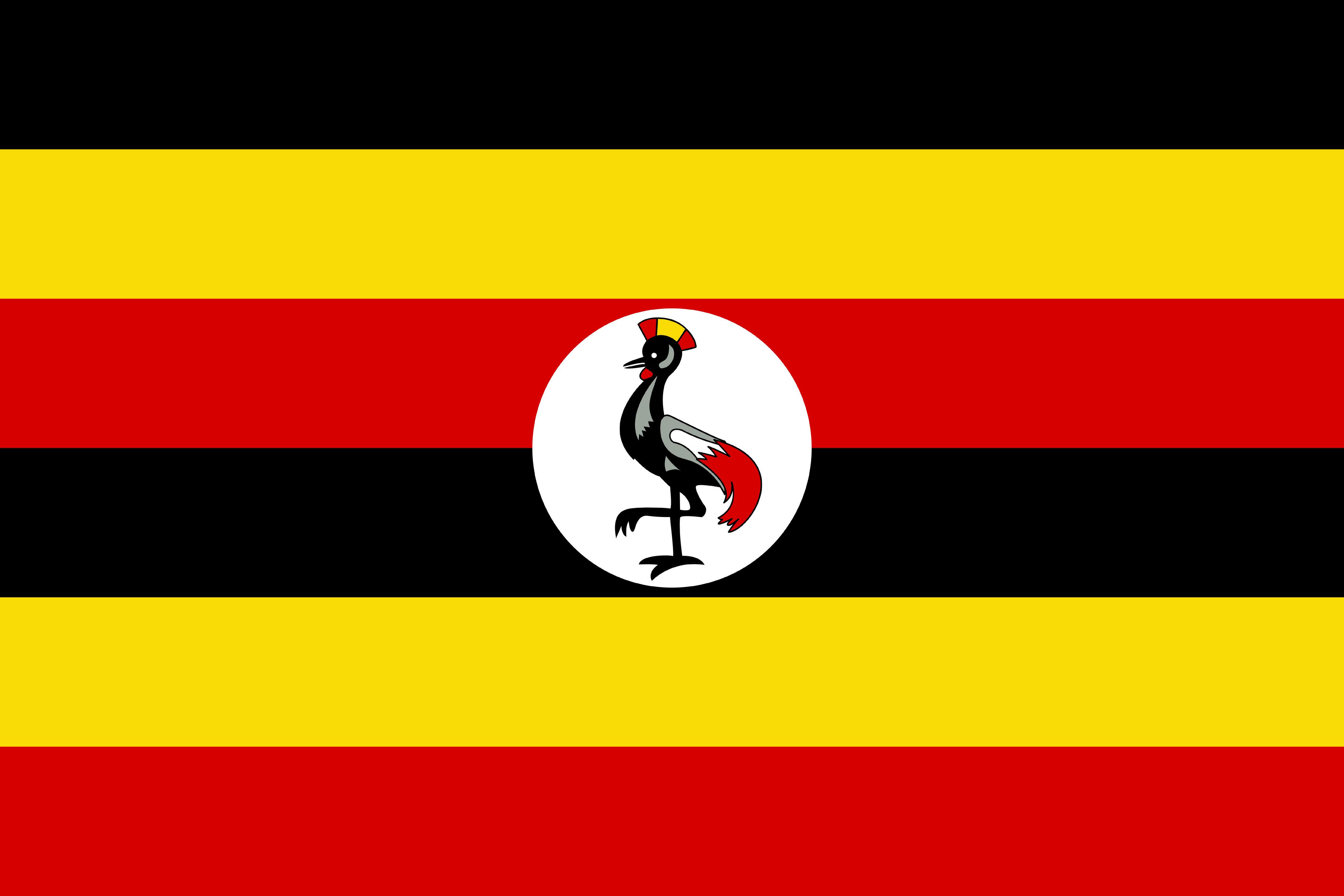
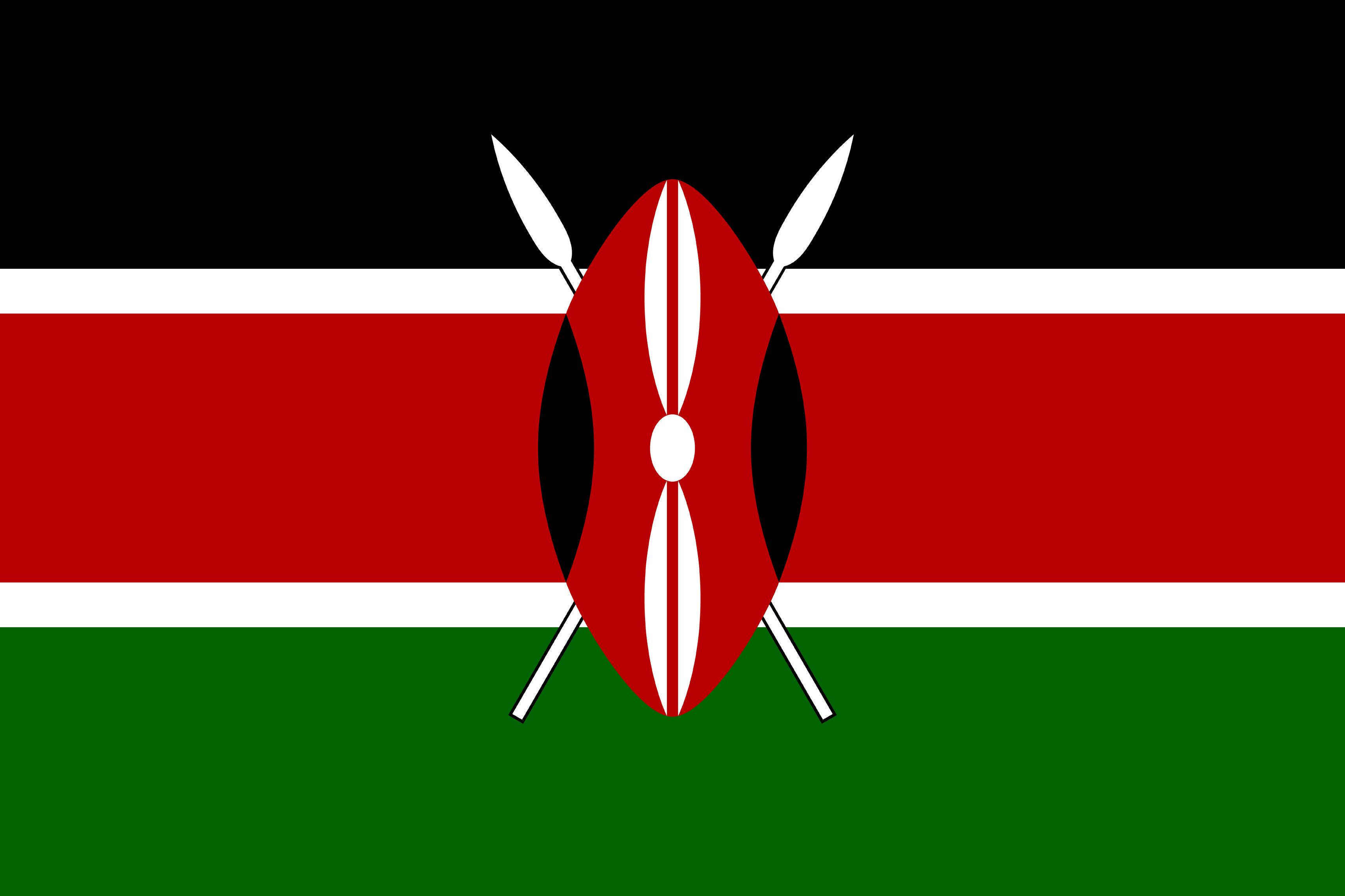

Nestled within the enchanting landscapes of East Africa, a region renowned for its vibrant tourism and indomitable marathon spirit, lies a momentous opportunity: the privilege of hosting Afcon 2027. Tanzania, Kenya, and Uganda stand as the triumphant hosts, triumphing over formidable contenders like Senegal, the homeland of Sadio Mane, and Egypt, where Mo Salah graces the pitch. Yet, amidst the jubilation, questions abound. What prowess does East Africa bring to the realm of football? Historically, the consensus leans towards modesty; while East Africans excel in endurance, the arena of soccer has remained largely uncharted. Why then, one might ponder, has the mantle of responsibility been bestowed upon these lands over Egypt and Senegal? perhaps, beyond the confines of the ninety-minute spectacle, lies an allure unmatched.
Picture perfect vistas from the majestic Kilimanjaro to the sprawling Masai Mara and Serengeti, the allure of Zanzibar and Mafia, the pulsating rhythm of Mombasa Island, and the vibrant nightlife of Kampala. Could it be that East Africa’s allure extends far beyond the football pitch?
United by a shared love for the beautiful game and fueled by a desire to showcase the rich tapestry of East African culture, the three nations embarked on a journey of collaboration unlike any other. Recognizing the strength in unity, they leveraged their combined resources, infrastructure, and unique offerings to present a compelling case to the Confederation of African Football (CAF).
The Pamoja bid was not merely a sum of its parts; it was a testament to the collective spirit of East Africa an embodiment of solidarity and cooperation in pursuit of a shared goal. The joint bid offered CAF a tantalizing proposition, a chance to witness the synergy of three vibrant nations, each offering its own blend of natural beauty, cultural heritage, and footballing passion. From the sprawling plains of the Serengeti to the bustling streets of Nairobi and the serene shores of Lake Victoria, East Africa beckoned with a promise of unparalleled hospitality and unforgettable experiences.
Ultimately, it was this spirit of collaboration and inclusivity that won the hearts and minds of CAF officials, propelling East Africa to victory in the race to host Afcon 2027. The Pamoja bid shattered stereotypes and redefined the narrative surrounding football in the region, elevating East Africa onto the international stage with pride and purpose.
With pride and anticipation, we declare East Africa as the beacon of unparalleled hospitality, promising to host Afcon 2027 with unmatched splendor. Yet, challenges loom on the horizon; Tanzania boasts only one FIFAstandard stadium, while Uganda and Kenya, regrettably, possess none. The clock ticks, and the standards must be met by January 2026, lest the opportunity slips through our grasp and finds solace in more prepared hands. However, amidst the trials, East Africa stands firm. With a plethora of luxurious accommodations and worldclass medical facilities, our resolve remains unwavering.
Ultimately, it was this spirit of collaboration and inclusivity that won the hearts and minds of CAF officials, propelling East Africa to victory in the race to host Afcon 2027. The Pamoja bid shattered stereotypes and redefined the narrative surrounding football in the region, elevating East Africa onto the international stage with pride and purpose. With pride and anticipation, we declare East Africa as the beacon of unparalleled hospitality, promising to host Afcon 2027 with unmatched splendor. Yet, challenges loom on the horizon; Tanzania boasts only one FIFAstandard stadium, while Uganda and Kenya, regrettably, possess none. The clock ticks, and the standards must be met by January 2026, lest the opportunity slips through our grasp and finds solace in more prepared hands.
However, amidst the trials, East Africa stands firm. With a plethora of luxurious accommodations and worldclass medical facilities, our resolve remains unwavering.
As we set our gaze upon Dodoma, Nairobi, and Kampala, the world anticipates the grandeur that awaits. Before the curtains rise on Afcon 2027, all eyes turn to Morocco 2025, where the continent will converge to witness footballing prowess in its purest form.
The echoes of the last World Cup, held in the Ivory Coast, still reverberate a testament to Africa’s ascent in the global footballing arena.
The Africa Cup of Nations, steeped in rich history since its inception in 1957, has been a testament to the continent’s footballing passion and talent. From the iconic victories of Cameroon’s Indomitable Lions to the legendary plays of Nigeria’s Super Eagles, the tournament has showcased Africa’s footballing diversity and resilience.
As the countdown to the World Cup begins, Afcon 2027 emerges as the quintessential stage to exhibit Africa’s footballing prowess. Let it be a testament to our collective dedication, showcasing to the world that Africa is not merely a participant but a formidable contender in the beautiful game.

In the grand tapestry of charity, where every act of kindness is a stroke of compassion, there exist luminaries whose deeds shine like beacons in the night. These are the African footballers, not just icons on the field, but guardians of hope and champions of humanity.
To the esteemed readers of People of Africa magazine, let us pause in reverence for these sons of the soil, whose commitment to their communities rivals their prowess on the pitch. Their stories are not mere anecdotes but epics of resilience, empathy, and unyielding dedication.




Mo Salah, his name a clarion call echoing through the sands of time, not only conquers stadiums but hearts as well. Beyond his goals and accolades lies a spirit as vast as the Nile, pulsating with a love for his native Egypt. With every gesture, Salah paints a portrait of African pride, his canvas adorned with acts of kindness and generosity that transcend borders and languages. From funding critical healthcare initiatives to ensuring access to clean water, Salah’s philanthropic endeavors have uplifted countless lives, his benevolence a guiding light in a worldtoo often marred by darkness.
Mo Salah:
Sadio Mané, a humble son of Senegal, whose journey from dusty pitches to global acclaim is a testament to the power of perseverance and humility. Amidst the glare of fame and fortune, Mané remains grounded, his gaze fixed not on trophies but on the faces of the children he uplifts through education and opportunity. From building schools and hospitals to providing scholarships and infrastructure development, Mané’s philanthropy knows no bounds, his generosity a testament to the transformative power of giving back.

Hakim Ziyech, a prince among men, embodies the epitome of perseverance and philanthropy.
From the bustling streets of Morocco to the illustrious heights of European football, his journey stands as a testament to the triumph of dreams over adversity. Despite the hurdles he encountered along the way, Ziyech’s unwavering commitment to his community remains steadfast, casting a radiant beacon of hope in a world often clouded by cynicism. Notably, many were captivated by his selfless act of donating all his World Cup earnings from the Moroccan national team to aid the underprivileged.
From funding essential healthcare initiatives to championing youth development programs, Ziyech’s philanthropic initiatives stand as a shiningexample of the profound impact that giving back can have on society.
Hakim ZiyechDidier Drogba, a titan of Ivorian football, whose name is synonymous with resilience and redemption. From the ashes of civil strife, Drogba emerged as a beacon of hope, using his fame to heal wounds and build bridges in his wartorn homeland. Through his foundation and tireless advocacy for peace and development, Drogba continues to be a guiding light for his nation and continent. From funding healthcare initiatives to promoting education and youth empowerment, Drogba’s legacy is not measured in goals scored but in lives touched and transformed.


Nwankwo Kanu, a symbol of hope in a world too often shrouded in darkness, whose journey from adversity to triumph inspires us all. Through his Kanu Heart Foundation, he extends a lifeline to those in need, his hands reaching across borders and oceans to heal broken hearts and shattered dreams. From funding life-saving surgeries to providing healthcare and education, Kanu’s philanthropy embodies the true spirit of ubuntu, his legacy a testament to the power of compassion and kindness.

Indeed, the stories of these footballing titans serve as a reminder that greatness is measured not only by goals scored or trophies won but by the lives touched and the hearts moved. As we bask in the glow of their generosity, let us heed the call to action, for charity knows no bounds and compassion knows no limits.
For in the end, it is not the accolades we amass or the fortunes we acquire that define us, but the legacy of love, compassion, and kindness we leave behind.
Thank you for joining us on this journey of celebration and gratitude, dear readers of People of Africa magazine. Together, let us continue to shine a light in the darkness and uplift those in need, for the true measure of greatness lies in the service of others.
Africanproverb


Ancient Origins Clay pottery has been an integral part of African culture for thousands of years, with evidence of pottery-making dating back to ancient civilizations such as the Nok culture in western Africa and the Kerma culture in Sudan.
Cultural Significance Clay pots served multifaceted roles within African societies, ranging from utilitarian purposes such as cooking, storing food, and carrying water to symbolic and ritualistic functions in ceremonies, rituals, and everyday life.
Traditional Techniques Pottery-making techniques were passed down through generations, with skilled artisans using locally sourced clay, natural pigments, and traditional firing methods to craft durable and functional vessels adorned with intricate designs, patterns, and symbols unique to each region and ethnic group.

and sustainable alternatives to modern cooking utensils. Their production requires minimal energy and resources, making them environmentally friendly choices.
2. **Enhanced Flavor - Clay pots are porous in nature, allowing for natural airflow and moisture retention during cooking. This results in enhanced flavors and textures, as the clay imparts subtle earthy notes to the food, making dishes more aromatic and delicious.
3. **Even Heat Distribution - Clay pots distribute heat evenly across their surfaces, ensuring uniform cooking and preventing hot spots or burning. This gentle and consistent heat helps to preserve the nutrients, flavors, and textures of the ingredients, resulting in well-cooked and nutritious meals.
g cooking, which helps retain the nutritional integrity of the ingredients. Unlike metal or plastic utensils, clay pots do not leach harmful chemicals or alter the taste of food, making them ideal for health-conscious individuals.
5. **Versatility and Durability - Clay pots are versatile vessels that can be used for various cooking methods, including boiling, steaming, simmering, and even baking. Their durability ensures longevity, with well-crafted clay pots lasting for generations when properly cared for and maintained.

In essence, African clay pots represent more than just vessels for cooking and storage; they embody a deep-rooted connection to tradition, culture, and community. Their enduring presence in African households underscores their timeless appeal and enduring relevance in a modern world increasingly yearning for sustainable, natural, and authentic alternatives.
“when a clay pot breaks, breaks into many pieces, but when a calabash breaks, it breaks into one piece”

It's a taste of freedom, a celebration of life's simple pleasures

Summer salad, the epitome of warm-weather delight! It's a symphony of flavors, a harmony of textures, and a celebration of freshness. Imagine a gentle breeze on a sunny day, carrying the sweet scent of ripe fruits and crisp greens. The tender leaves of lettuce, like nature's own embrace, cradle the vibrant colors of juicy tomatoes, succulent berries, and crunchy cucumbers.
Each bite is a sensual experience, a dance of flavors on the palate. The tangy zip of citrus, the subtle sweetness of honey, and the savory depth of herbs all blend in perfect harmony.
Summer salad is a love letter to the senses, a culinary serenade that whispers sweet nothings of joy and satisfaction. It's a taste of freedom, a celebration of life's simple pleasures, and a reminder to savor every moment of warmth and delight. So, indulge in this delightful dish, and let the essence of summer salad fill your heart with warmth and your senses with wonder!

2 large green tomatoes, sliced into 1/4-inch thick rounds
2 large red tomatoes, sliced into 1/4-inch thick rounds (to be eaten raw)
2 large parsnips, peeled and sliced into 1/4-inch thick rounds (to be eaten raw)
1 large beet root, peeled and sliced into 1/4-inch thick rounds (to be eaten raw)
- 1/4 cup olive oil
- Salt and pepper to taste
- 1/4 cup chopped fresh parsley
- 1/4 cup pitted and sliced black olives Pan-Fried Green Tomatoes with Raw Red Tomatoes, Parsnips, Beet Root, Parsley, and Black Olive Garnish
1. Heat the olive oil in a large skillet over medium-high heat.
2. Add the green tomato slices and cook for 3-4 minutes on each side, until tender and lightly browned.
3. While the green tomatoes are cooking, prepare the raw vegetables by slicing them into thin rounds.
4. To plate, place a few slices of the fried green tomatoes on a plate, then top with a few slices of raw red tomatoes, parsnips, and beet root.
5. Garnish with chopped parsley and sliced black olives.
6. Serve immediately and enjoy!
Since the raw vegetables will be eaten raw, make sure to handle them safely and wash them thoroughly before slicing.


Ingredients:
1 cup orzo
2 cups water
2 cups cherry tomatoes, halved
1/4 cup olive oil
Juice of 1 lime
1 tsp black pepper
1/4 cup fresh basil leaves, chopped
3 cloves roasted garlic, minced
Orzo Salad with Cherry
Tomatoes, Olive Oil, Lime, Black Pepper, Basil, and Roasted Garlic (Summer Salad)
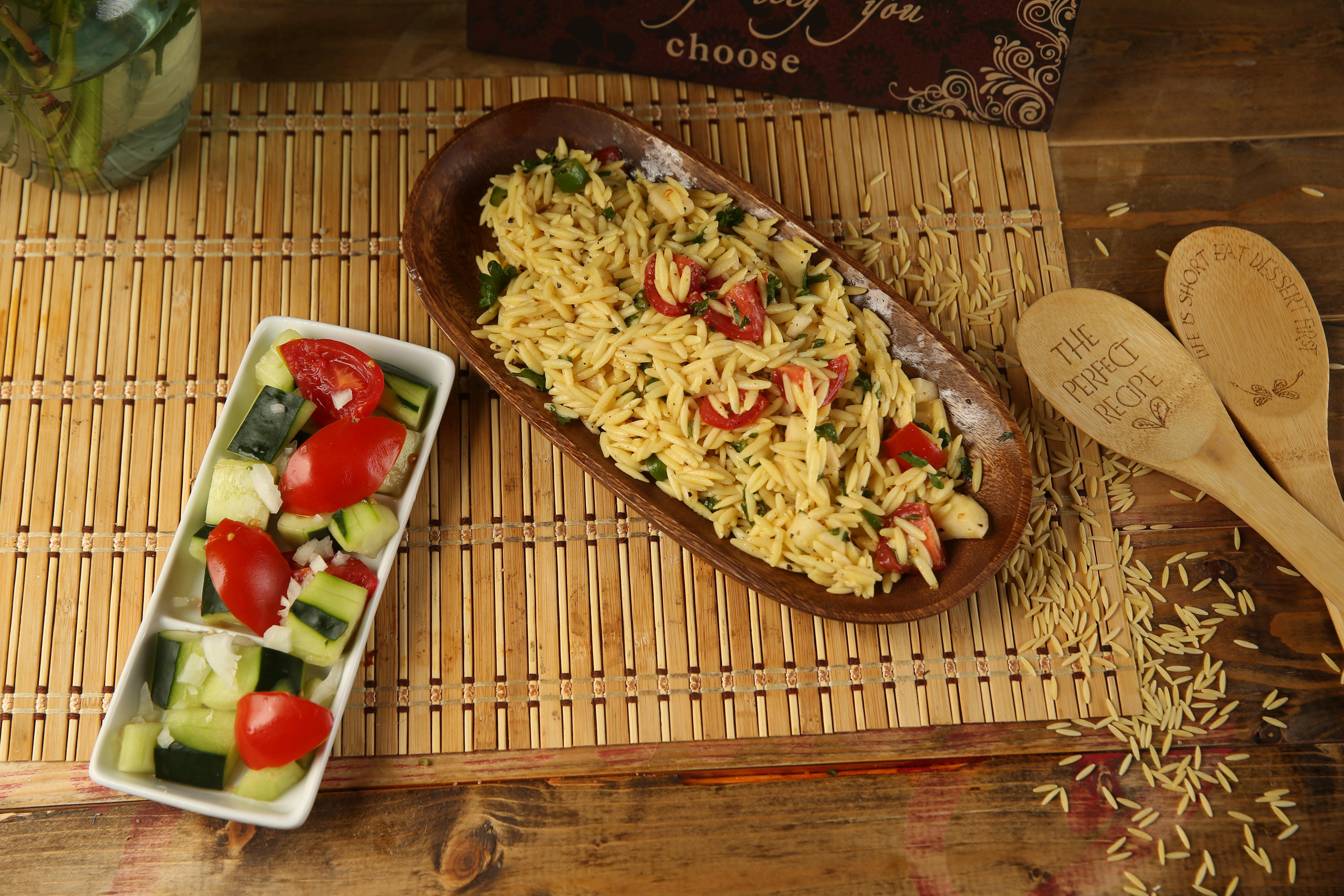
1. Preheat your oven to 400°F (200°C).
2. Cut the top off a whole head of garlic, drizzle with olive oil, and wrap in foil. Roast for 30-40 minutes until soft and mashed. Let cool.
3. Cook the orzo according to package instructions using 2 cups of water. Drain and set aside.
4. In a large bowl, combine the cooked orzo, cherry tomatoes, olive oil, lime juice, black pepper, chopped basil, and roasted garlic.
5. Toss gently to combine.
6. Serve warm or at room temperature.

Notes:
- To roast garlic, simply follow the steps above. You can also use pre-minced garlic if you prefer.
- Adjust the amount of lime juice and black pepper to taste.
- Feel free to add other ingredients like grilled chicken, feta cheese, or sliced red onions to make the salad more substantial.
Enjoy your delicious summer salad!
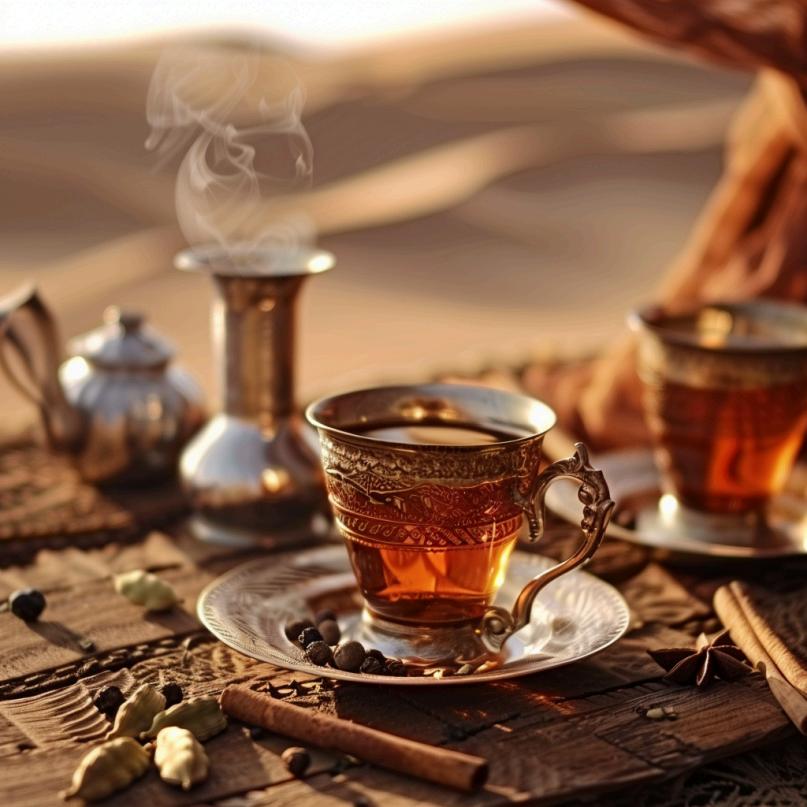
In the delicate dance of life, amidst the symphony of moments, tea emerges as a silent conductor, orchestrating connections and weaving tales of warmth and belonging. For many, tea is not merely a concoction of leaves and water; it is a whispered greeting, a tender farewell a vessel brimming with the essence of friendship, love, and joy.
Across continents and cultures, the ritual of tea takes on myriad meanings, yet at its heart lies a universal truth: the profound pleasure and solace it brings to the soul. From the bustling streets of Unguja to the serene tea gardens of Darjeeling, from the tranquil tea houses of Kyoto to the vibrant markets of Marrakech, tea weaves its magic, transcending language and borders.
Some believe that with each sip of tea, a bond is forged a silent conversation that traverses hearts and minds. The first cup is a gentle hello, a tentative introduction; the second, a whispered affirmation a nod of understanding and kinship; and by the third, the tea-drinker and the host become kindred spirits, bound by the threads of shared experiences and cherished moments.
Tea is more than a beverage; it is a healer, a confidant, a companion in times of joy and sorrow. In its warm embrace, troubles melt away, and worries dissipate like morning mist.
Whether brewed with herbs for medicinal purposes or savored for its aromatic delight, tea speaks a language of comfort and solace a language understood only by those who have felt its soothing caress upon their lips. And now, let us embark on a journey of flavors, a fusion of cultures, encapsulated in the enchanting brew of Tea Masala.
A symphony of African fusion, echoing the melodies of Arabic spices and the rhythms of the Indian Ocean. Picture, if you will, the delicate dance of lemongrass and ginger, entwined with the sweet embrace of vanilla and the robust notes of black English tea leaves. And to crown this masterpiece, the vibrant hues of hibiscus and the subtle fragrance of lavender, imparting a symphony of flavors that dance upon the palate and awaken the senses.

So, dear friend, as you partake in this enchanting elixir, let each sip be a celebration a toast to life, love, and the timeless allure of tea. For in the simple act of sharing a cup of tea, we find communion, connection, and the gentle reminder that amidst the chaos of the world, there is always solace to be found in the warmth of friendship and the beauty of a shared moment.

1. Begin by preparing the Tea Masala spice blend. In a mortar and pestle or spice grinder, combine the cardamom pods, cloves, chopped ginger, black pepper, and cinnamon stick. Grind the spices together until you achieve a coarse powder. This aromatic mixture will form the heart of your Tea Masala.
2. In a saucepan, bring 2 cups of water to a gentle boil over medium heat. Once the water reaches a simmer, add the black tea leaves to the pot. Allow the tea leaves to infuse the water for 1-2 minutes, depending on your preferred strength of tea.
3. After the tea has steeped, reduce the heat to low and add 1-2 teaspoons of the prepared Tea Masala spice blend to the pot. Stir the mixture gently to incorporate the spices into the tea. Let the tea simmer for an additional 2-3 minutes to allow the flavors to meld together.
4. If desired, you can add milk to your tea for a creamy and indulgent twist. In a separate saucepan, warm 1 cup of milk over low heat until it is just starting to steam. Be careful not to boil the milk, as it can scald and develop a burnt flavor.
- 4 cardamom pods
- 4 cloves
- 1-inch piece of ginger, peeled and chopped
- 1 teaspoon black pepper
- 1 cinnamon stick
- 2 tablespoons black tea leaves
- 2 cups water
- 1 cup milk (optional)
- Honey or sugar to taste (optional)
5. Once the milk is warm, add 1-2 teaspoons of the Tea Masala spice blend to the pot. Stir the mixture gently to combine the spices with the milk. Let the milk simmer for 2-3 minutes to infuse the flavors.
6. After both the tea and milk have been infused with the Tea Masala spice blend, strain them through a fine-mesh sieve or tea strainer into teacups. If desired, sweeten the tea with honey or sugar to taste.
7. Serve your aromatic Tea Masala hot and enjoy the comforting blend of spices and warmth. This indulgent brew is perfect for a cozy afternoon pick-meup or as a soothing treat any time of day.

In the gentle twilight hours, amidst the whispers of evening, a serendipitous moment unfolded a story woven from the threads of love and the innocence of a simple mistake. It was a quiet evening, much like any other, when the melody of laughter and conversation danced through the air, carrying the warmth of familial bonds across the miles.
As I spoke with my mother, the cherished rhythm of our conversation swirled around me, wrapping me in a comforting embrace. In the midst of our dialogue, a simple act of absentmindedness led to the delightful discovery of a mistake that bloomed into a cherished tradition. With the lavender canister in hand, I absentmindedly opened it, intending to add its fragrant essence to a pot of boiling water already infused with the vibrant hues of hibiscus. But fate had other plans, as the lavender petals cascaded gracefully into the pot, merging with the swirling currents of steam and color.

- 3 teaspoon hibiscus
- 2 tablespoons lavender
-4 cups water
- Honey or sugar to taste (optional)
And so, in that unexpected moment, my favorite tea was born a delicate dance of flavors and aromas, born from a mother’s love and a daughter’s whimsy. As the water simmered and the fragrance of lavender mingled with the sweet notes of hibiscus, a sense of calm washed over me a soothing balm for the soul in the tranquil hours of evening. To recreate this enchanting brew, simply bring water to a gentle boil and infuse it with the vibrant hues of hibiscus petals. Sweeten to taste with sugar or honey, if desired. Then, as the water begins to dance with the essence of hibiscus, add a sprinkle of lavender petals to the pot, allowing their delicate fragrance to permeate the brew.
And so, dear reader, in the quiet moments of evening, amidst the symphony of laughter and love, may you find solace in the simple pleasures of a cup of tea a testament to the beauty of serendipity and the magic of a mother’s touch.


- 1 small pumpkin (about 2 lbs), peeled, seeded, and cubed
- 2 tbsp olive oil
- 2 sprigs fresh rosemary, chopped
- 1 onion, chopped
- 4 cloves garlic, minced
- 4 cups chicken or vegetable broth
- 1 cup heavy cream or halfand-half (optional)
- Salt and pepper to taste
- Fresh basil leaves and roasted pumpkin pieces for garnish

1. Preheat your oven to 400°F (200°C).
2. Toss the pumpkin cubes with 1 tbsp olive oil, salt, and pepper on a baking sheet. Roast for 30-40 minutes until tender and caramelized. Set aside.
3. In a large pot, heat the remaining 1 tbsp olive oil over medium heat. Add the chopped onion and cook until softened, about 5 minutes.
4. Add the minced garlic and cook for an additional 1-2 minutes until fragrant.
5. Add the chopped rosemary, broth, and roasted pumpkin to the pot. Bring to a boil, then reduce heat and simmer for 20-25 minutes or until the soup is smooth and creamy.
6. Use an immersion blender or a regular blender to puree the soup until smooth.
7. If desired, stir in the heavy cream or half-and-half to add a rich and creamy texture.
8. Season with salt and pepper to taste.
9. Serve hot, garnished with a sprinkle of basil leaves and roasted pumpkin pieces.

- 4-6 bone-in, skin-on chicken legs and thighs
- 4 tbsp unsalted butter
- 2 tsp freshly ground black pepper
- 2 sprigs fresh rosemary, chopped
- 1 cup orange juice (fresh or bottled)
- Salt to taste
- Fresh basil leaves and orange slices for garnish
Instructions:

3. In a large Dutch oven or heavy pot, melt 2 tbsp of butter over medium heat. Add the chopped rosemary and cook for 1-2 minutes until fragrant.
4. Add the chicken legs and thighs to the pot, skin side up. Cook for 5-7 minutes until browned, then flip and cook for an additional 5 minutes.
5. Pour in the orange juice, making sure the chicken is covered. If necessary, add a little more juice or water.
6. Cover the pot with a lid and transfer it to the preheated oven. Braise for 1 hour, or until the chicken is tender and falls apart easily.
7. Remove the pot from the oven and garnish with fresh basil leaves and orange slices.
8. Serve hot, spooning some of the rich sauce over the chicken.


- 1 lb. spaghetti
- 6 tbsp. butter
- 2 cloves garlic, minced
- 2 tsp. ground black pepper
- 1 3/4 cups grated Pecorino Romano cheese

Instructions:
1. Bring a large pot of lightly salted water to a boil.
2. Cook spaghetti in boiling water, stirring occasionally, until tender yet firm to the bite, about 12 minutes.
3. Reserve 1 cup cooking water, then drain spaghetti.
4. Heat butter in a large skillet over medium heat.
5. Cook and stir garlic and pepper in hot oil until fragrant, 1 to 2 minutes.
6. Add cooked spaghetti and Pecorino Romano cheese.
7. Ladle in 1/2 cup reserved cooking water; stir until cheese is melted, about 1 minute.
8. Stir in more cooking water as needed, 1 tbsp. at a time, until sauce coats spaghetti, about 1 minute more.

- 12 large shrimps, peeled and deveined
- 1 handful of fresh spinach leaves
- 3 cloves of garlic, minced
- 2 sprigs of fresh rosemary, chopped
- 1/4 cup of olive oil
- 1/2 cup of white wine (optional)
- 1 tablespoon of freshly squeezed lemon juice
- Salt and pepper to taste
- 1 cup of linguine pasta
- Grated Parmesan cheese (optional)

1. Bring a large pot of salted water to a boil and cook the linguine according to package instructions until al dente. Reserve 1 cup of pasta water before draining.
2. In a large skillet, heat the olive oil over medium heat. Add the minced garlic and cook for 1-2 minutes until fragrant.
3. Add the shrimps and cook for 2-3 minutes per side until pink and cooked through.
4. Add the chopped rosemary and cook for an additional minute.
5. Add the handful of spinach leaves and cook until wilted.
6. If using white wine and lemon juice, add to the skillet and cook for an additional 2 minutes.
7. Add the cooked linguine to the skillet, tossing to combine with the shrimp and spinach mixture.
8. Season with salt and pepper to taste.
9. Serve immediately, topped with grated Parmesan cheese if desired.

This recipe is perfect for a romantic summer dinner, with the light and flavorful ingredients and the aroma of garlic and rosemary filling the air. You can also add some candles and soft music to make it a more intimate setting. Buon appetito!

- 2 cups rice flour
- 1 teaspoon salt
- 1/4 cup sugar
- 1 packet (2 1/4 teaspoons) active dry yeast
- 1 cup warm coconut milk (about 100°F to 110°F)
- 2 large eggs
- 2 tablespoons unsalted butter, melted
- 1 teaspoon ground cardamon

1. In a small bowl, combine warm coconut milk and yeast. Stir to dissolve, then let sit for 5-10 minutes until frothy.
2. In a large mixing bowl, whisk together rice flour, salt, and sugar.
3. Add eggs, melted butter, and vanilla extract to the dry ingredients. Mix until a smooth batter forms.
4. Add the yeast mixture and mix until well combined.
5. Pour into a greased and floured cake pan (8-inch round or 9x5-inch loaf). let it rise for about 30 minutes
6. Bake at 350°F for 35-40 minutes or until a toothpick inserted in the center comes out clean.
7. Let cool on a wire rack for 10-15 minutes before transferring to a plate or serving dish.
Note: Rice flour can behave differently than wheat flour, so you may need to adjust the liquid content or cooking time. Keep an eye on the cake while it's baking and adjust as needed!
This cake will have a delicate, tender crumb and a subtle yeast flavor. You can also experiment with adding flavorings like lemon zest, orange extract, or nuts to create different variations. Enjoy!

Ingredients:
- 3 large overripe bananas, mashed
- 1 cup coconut milk
- 2 tsp active dry yeast
- 2 tbsp sugar
- 4 cups all-purpose flour
- 1 tsp baking powder
- 1/2 tsp salt
- 1/4 tsp ground cardamom
- 1/4 cup unsweetened shredded coconut (optional)
1. In a small bowl, combine yeast, sugar, and 1/2 cup coconut milk. Stir to dissolve yeast, then let sit for 5-10 minutes until frothy.
2. In a large mixing bowl, whisk together flour, baking powder, salt, and cardamom.
3. Add mashed bananas, remaining coconut milk, and yeast mixture to the dry ingredients. Mix until a smooth batter forms.
4. Pour into a greased loaf pan and top with unsweetened shredded coconut (if using).
5. Bake at 350°F for 45-50 minutes or until a toothpick inserted in the center comes out clean.
6. Let cool on a wire rack for 10-15 minutes before transferring to a plate or serving dish.
This recipe will yield a moist and aromatic banana bread with a subtle coconut flavor and a hint of cardamom.
Enjoy!

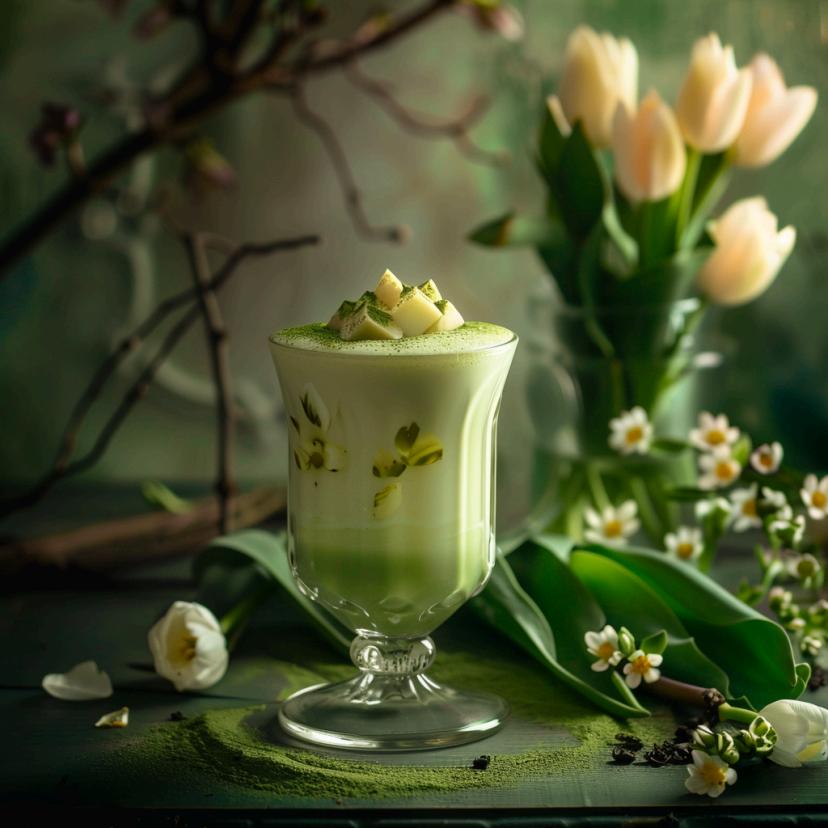
Welcome to our guide on homemade energy drink recipes using simple ingredients found right in your kitchen! In today’s fast-paced world, maintaining energy levels throughout the day is essential for productivity and overall well-being. While store-bought energy drinks may seem like a convenient solution, they often contain artificial additives and high levels of sugar, leading to potential health concerns. But fear not! We’ve curated a collection of five energizing recipes that are not only delicious but also nutritious, using natural ingredients that provide a sustainable boost of energy without the crash.

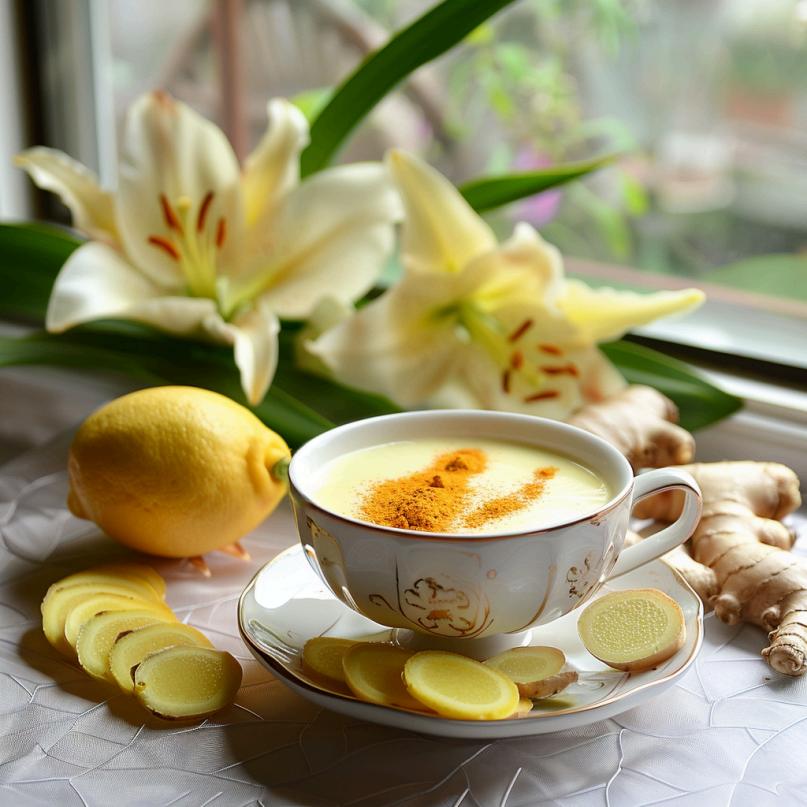


From citrus-infused elixirs to antioxidant-rich smoothies, each recipe harnesses the power of whole foods to fuel your body and mind. Whether you’re looking for a morning pick-me-up, a mid-afternoon refresher, or a pre-workout boost, these homemade energy drinks offer a healthier alternative to commercial options. So, say goodbye to artificial ingredients and hello to revitalizing homemade concoctions that will leave you feeling energized and refreshed throughout the day. Let’s dive in and discover the joy of homemade energy drinks!
1 cup of fresh orange juice, 1 tablespoon of lemon juice, 2 tablespoons of lime juice, 2 tablespoons of honey, a pinch of salt, and 1 cup of water.
Mix all the ingredients together in a blender until well combined. Pour into a glass over ice and enjoy the refreshing boost of energy from the citrus fruits and natural sweetness of honey.
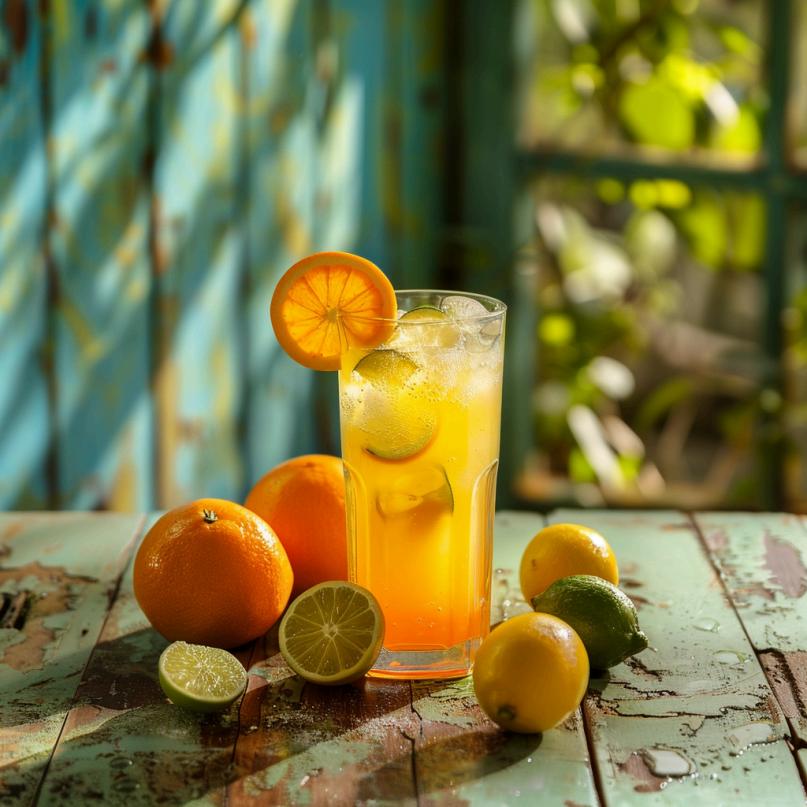
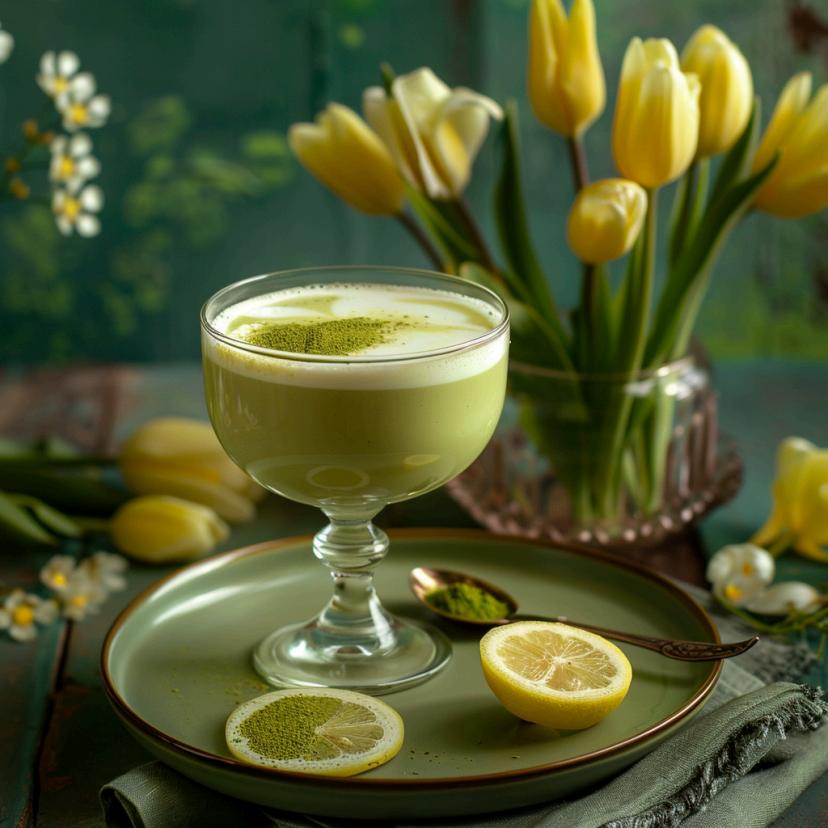
1 teaspoon of matcha green tea powder, 1 tablespoon of honey, juice of half a lemon, and 1 cup of cold water.
Whisk the matcha powder and honey into the cold water until dissolved Add lemon juice and stir well.
Serve over ice for a revitalizing energy boost packed with antioxidants.

1-inch piece of fresh ginger (grated), 1 teaspoon of ground turmeric, juice of 1 lemon, 1 tablespoon of honey, a pinch of black pepper, and 1 cup of warm water.
Combine all ingredients in a mug and stir until well mixed. Let it steep for a few minutes before straining. Sip this warming elixir to invigorate your body and mind with the potent anti-inflammatory properties of ginger and turmeric.
1 cup of coconut water, juice of half a lime, a pinch of sea salt, and 1 teaspoon of honey (optional)
Mix all the ingredients in a glass until well combined. The natural electrolytes in coconut water combined with the tangy lime juice and a hint of sweetness from honey make this a refreshing and hydrating energy drink.


1/2 cup of mixed berries (strawberries, blueberries, raspberries), 1/2 banana, 1/2 cup of Greek yogurt, 1 tablespoon of honey, and 1/2 cup of almond milk.
Blend all the ingredients together until smooth and creamy. This delicious smoothie is packed with antioxidants, vitamins, and protein, providing sustained energy to fuel your day.
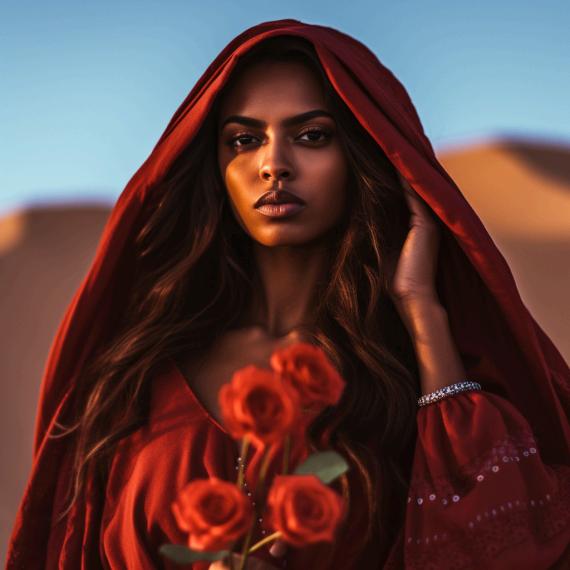
A tale of Passion, romance and the fear within A tale of Passion, romance and the fear within
A tale of Passion, romance and the fear within
“And when tears flow like a river, remember that they are not a sign of weakness but, a testament to the depth of your emotions and the capacity of your heart to love fiercely and unconditionally, with all the love and empathy that time has gifted me your older wiser self,”
Leila Bint Sadiqby honeymoon aljabri by honeymoon aljabri by honeymoon aljabri
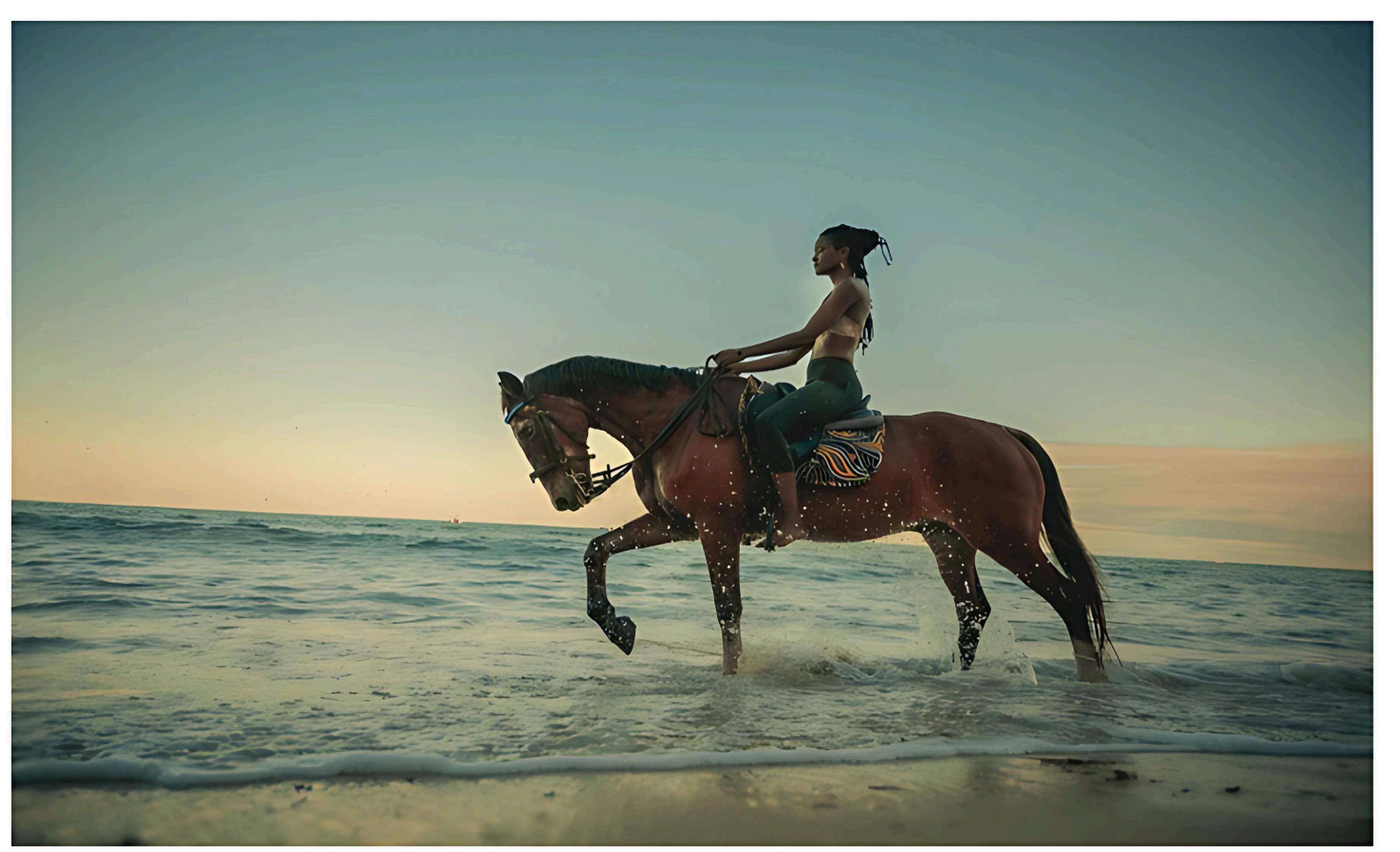
THE INSPIRATIONAL JOURNEY OF KENYAN EQUESTRIAN,
In the grand tapestry of African sports, where the rhythms of the savannah often echo through the strides of marathon runners and the grace of soccer players, there emerges a new chapter one of elegance, determination, and the resounding beat of hooves on African soil. Meet Nandi Kegode, a beacon of hope and pride for Kenya, whose journey to the Olympic stage embodies the very essence of African spirit and resilience.
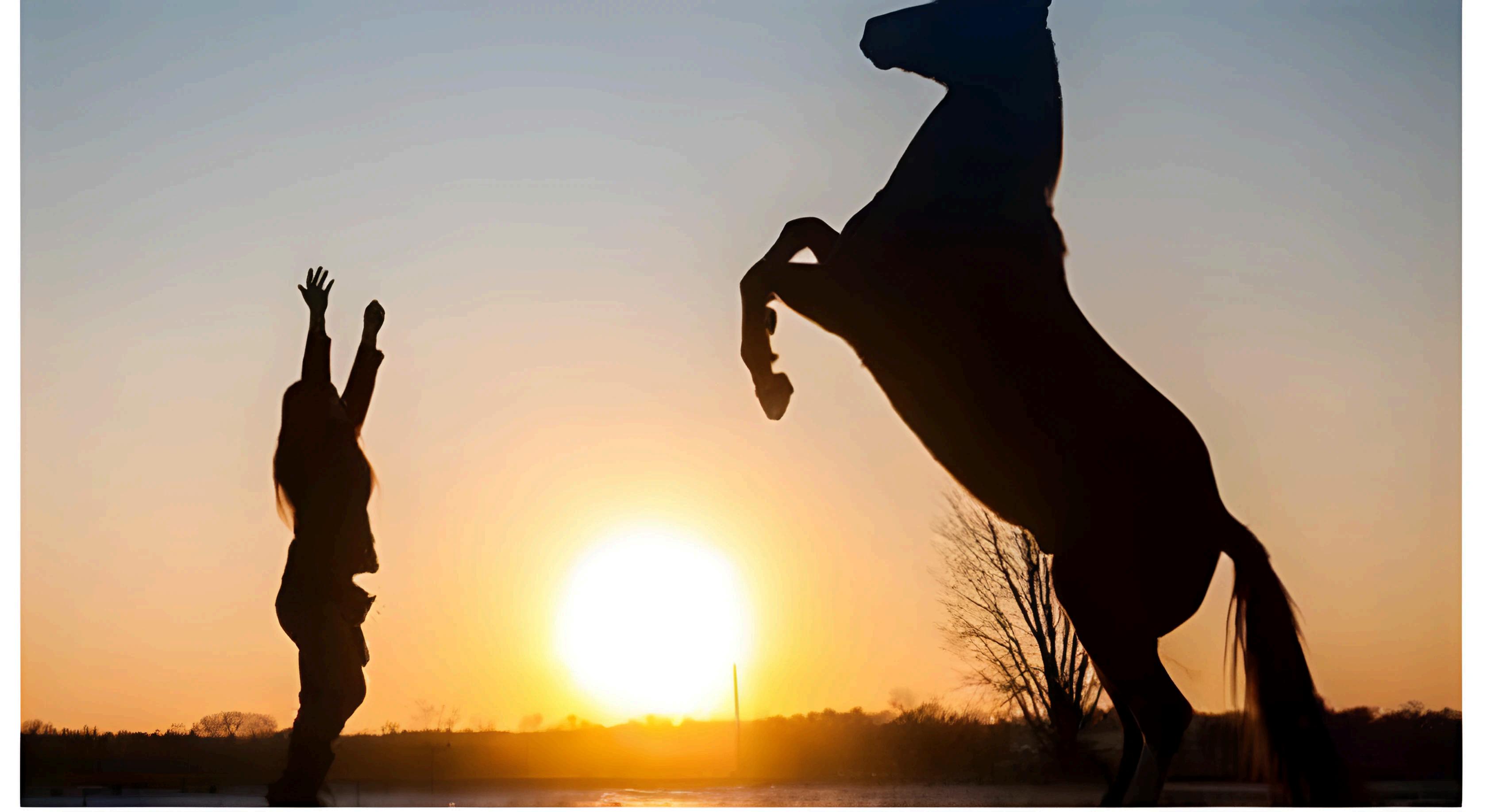
Picture this: the golden plains of Kenya, bathed in the warm hues of the setting sun, where the bond between rider and horse transcends language and borders. Nandi’s journey begins with Idana, her majestic companion and fellow warrior, born in the heartlands of Belgium (KWPN) yet destined for greatness on African soil. Together, they weave a tale of unity a testament to the unbreakable bond between human and horse, and the shared pursuit of excellence.
From the bustling streets of Nairobi to the tranquil halls of academia in Denver and St. Andrews, Nandi’s quest for knowledge mirrors her pursuit of sporting glory. Armed with a heart full of dreams and a mind hungry for wisdom, she embarks on a journey that defies convention and challenges the very essence of what it means to be African.
ASymphonyofStrength
In the arena of equestrian sports, where grace meets power and determination reigns supreme, Nandi emerges as a force to be reckoned with. With over three decades of riding experience and a decade of competitive prowess, she stands tall on the shoulders of giants, ready to carve her name into the annals of history.
As Kenya’s first equestrian future Olympian, her journey is not just about medals and accolades it’s a testament to the indomitable spirit of the African people, and the boundless potential that lies within each and every one of us.
As Nandi speaks of her beloved Idana, her eyes dance with pride and joy. “She’s not just a horse” she says, her voice filled with reverence. “She’s a queen a symbol of strength, beauty, and the unbreakable bond between rider and steed.” Together, they embody the very essence of African spirit a spirit that knows no bounds and refuses to be confined by the limitations of geography or circumstance.
“These animals are powerful yet, act with humanity and humbleness.”
Nandi added that the Queen is not only her teammate but her soul provider. “I have learned so much from Queen than any human,” she continues. “She taught me how to forgive, to love, and to work hard. Idana exudes confidence in her ability, she works hard, she trains with all of her heart.”
Nandi explains that she wishes many people could get opportunities to work with horses. “These animals are powerful yet, act with humanity and humbleness.”
“It’s a love that knows no bounds a love that defies logic and reason yet feels as natural as the rising sun.”
But its not just about the trophies or the triumphs, it’s about the love that flows between two souls, united by a common purpose and a shared dream. Idana isn’t just a horse to Nandi she’s a friend, a confidante, and a source of endless inspiration. From the moment they first met, there was an instant connection, a spark that ignited a fire within Nandi’s heart, propelling her towards greatness. As they train together in Europe, their bond only grows stronger.
With each stride, each jump, and each moment spent in each other’s company, they forge a connection that transcends words a silent understanding that speaks volumes.
It’s in the way Idana nuzzles against Nandi’s chest, seeking comfort and reassurance, or the way Nandi’s eyes light up with joy whenever she’s in Idana’s presence. It’s a love that knows no bounds a love that defies logic and reason yet feels as natural as the rising sun.


Nandi’s quest for Olympic glory is not just about personal triumph it’s about reigniting Kenya’s passion for equestrian sports and preserving the legacy for future generations.
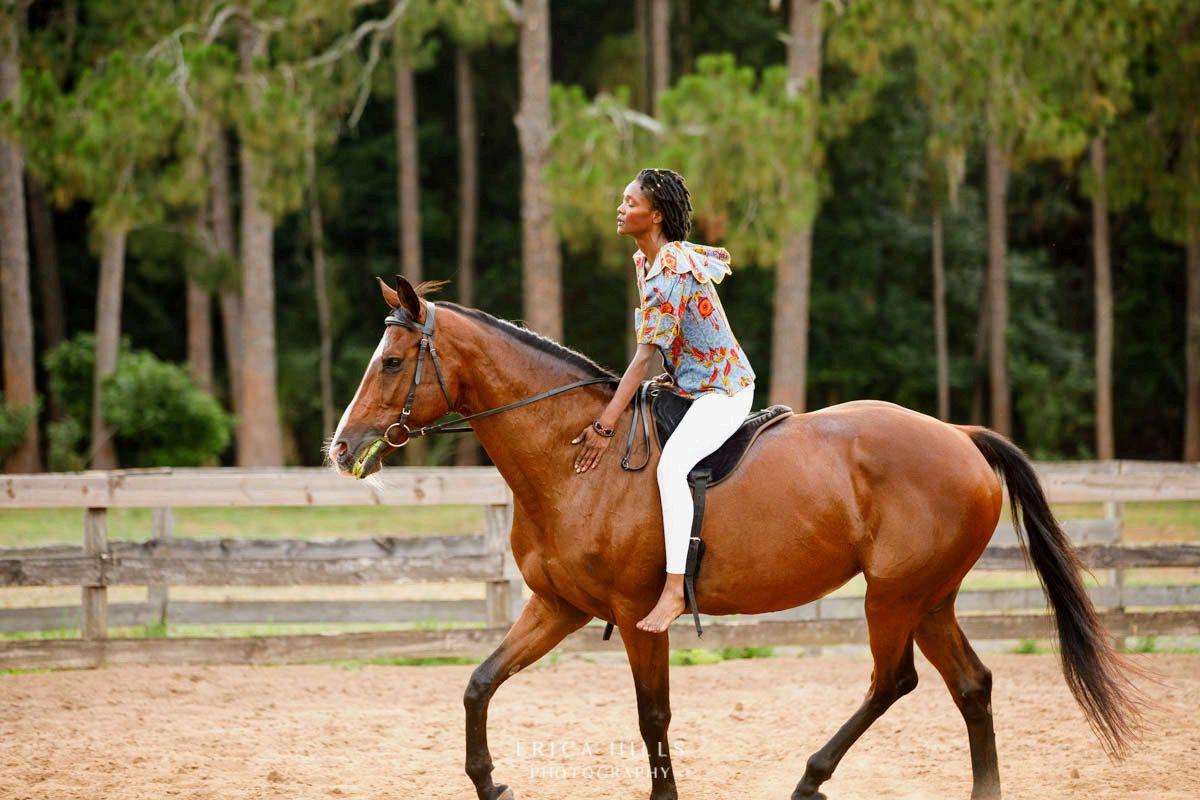
To understand the significance of Nandi’s journey, one must delve into the rich tapestry of equestrian history in Kenya. From the humble beginnings of Gymkhana racing to the present day, Kenya’s love affair with horses runs deep. Yet, in recent years, this once-thriving tradition has waned, overshadowed by the winds of change and the pressures of modernity. Nandi’s quest for Olympic glory is not just about personal triumph it’s about reigniting Kenya’s passion for equestrian sports and preserving the legacy for future generations. With a focus on showjumping, she aims to showcase Kenya’s untapped potential on the global stage, harnessing the power of sport to drive tourism, investment, and national pride.
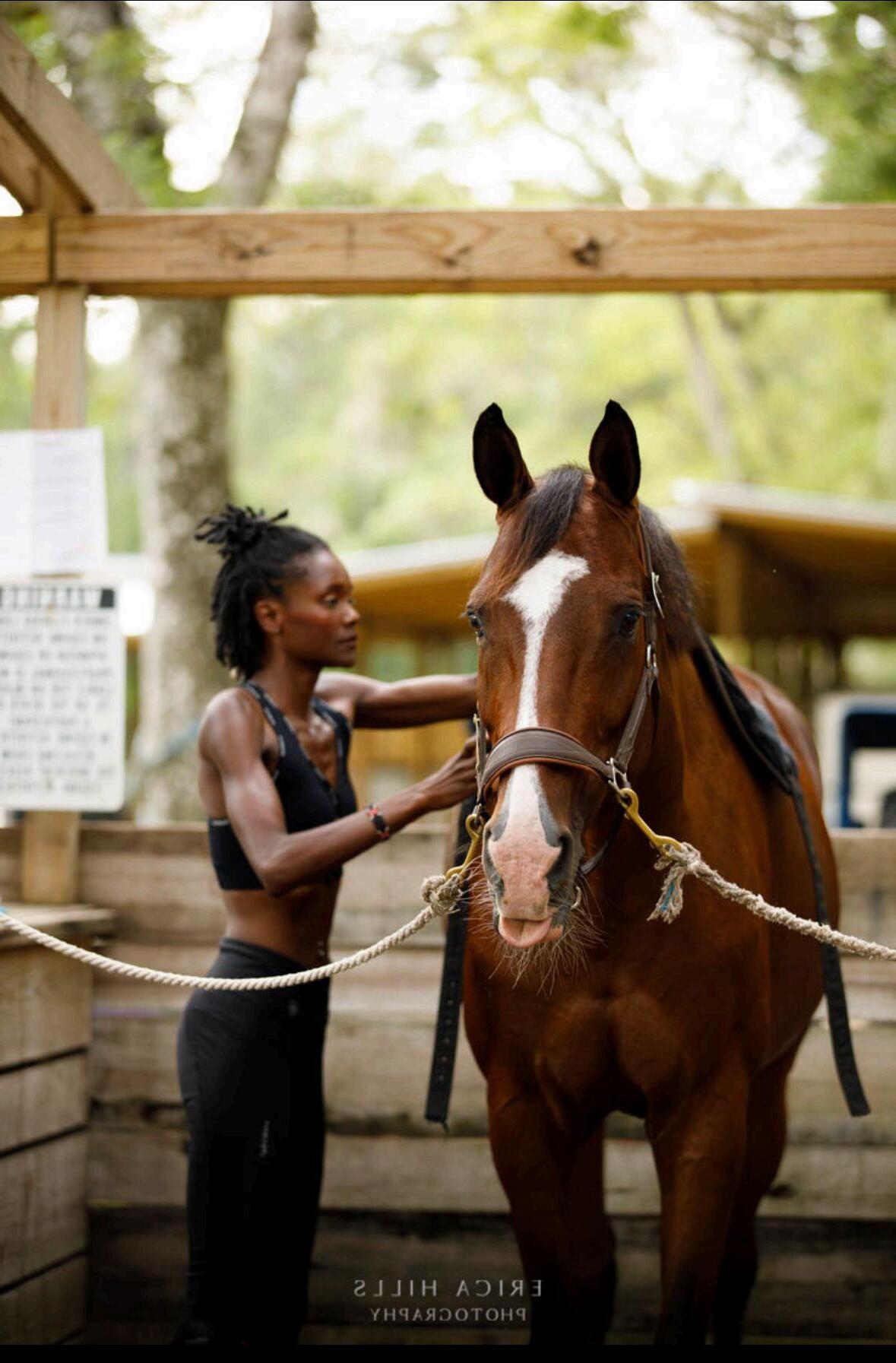
Although reaching the Olympic stage in this sport demands a significant investment of money, as it’s known as one of the most expensive sports worldwide.
As Nandi looks towards the future, her vision extends far beyond the Olympic arena. Armed with a perspective PhD in Behavioral Leadership Psychology, she seeks to bridge the gap between Western ideologies and indigenous wisdom, paving the way for a more inclusive and equitable society. For Nandi, the Olympic dream is not just about personal glory it’s about championing a continent’s dreams, one stride at a time.

As our conversation with Nandi comes to a close, we ask her what Africa means to her. In Nandi’s world, Africa isn’ just a place it’s a state of mind, a celebration of diversity, and a testament to the resilience of the human spirit.
“Ubuntu, I’m here because you are,” she says. And as she prepares to embark on this monumental journey, she extends an invitation to her fellow Africans and indeed, to the world to join her in celebrating the power of dreams and the boundless potential of the African spirit.
For in the symphony of life, every note, every stride, and every beat is a testament to the beauty and strength of the African soul.
“Go team Africa, see you in Paris,” she concludes our talk with a big smile on her face.


1884 1884 1884 2024 2024 2024 we come as one


When it comes to the marathon, Tanzania boasts a rich legacy that stretches back decades, embodying the spirit of resilience and determination. The iconic words of John Stephen Akwari, echoed in 1968, serve as a timeless reminder of the indomitable will of Tanzanian athletes. “My country didn’t send me 5,000 miles to start the race; they sent me to finish it,” encapsulates the ethos ingrained in every Tanzanian runner a testament to their unique discipline and strength. But what truly defines greatness in marathon running? Is it merely crossing the finish line in record time, or does it entail something deeper a fusion of courage, perseverance, and an unwavering belief in oneself? n the realm of marathon running, Tanzania’s Gabriel Geay emerges as a beacon of inspiration, his journey from obscurity to acclaim a testament to the human spirit’s resilience.

With just few races, Geay has etched his name onto the global stage, captivating audiences with his remarkable prowess and unwavering determination. The 2023 Boston Marathon witnessed a seismic shift in the running world as Geay, once considered an underdog, defied expectations to claim a remarkable secondplace finish. His relentless pace tested the limits of even the most seasoned veterans, including Eliud Kipchoge, whose sixth-place finish marked a rare stumble in his illustrious career.
For Tanzanians, Geay’s triumph was more than just a victory it was a celebration of their nation’s rich running tradition, a moment of pride that reverberated across the country. While 2024 “Boston Marathon” may not have yielded the same level of success, Geay remains undeterred, his eyes firmly set on the upcoming Olympics in Paris a testament to his unwavering resolve and dedication to his craft.
Reflecting on his journey, Geay pays homage to Tanzania’s past champions, such as Filbert Bayi, whose historic silver medal at the 1980 Olympic Games in Moscow served as a catalyst for generations of aspiring athletes. Hailing from Manyara, a picturesque town nestled amidst Tanzania’s breathtaking landscapes, Geay’s journey epitomizes the transformative power of running in shaping lives and futures.
With each stride, he embodies the spirit of resilience and determination that defines Tanzania’s running tradition a testament to the enduring legacy of his predecessors.

Yet, Geay’s path has not been without its challenges. The road to marathon success is paved with setbacks and sacrifices, as evidenced by his bittersweet experience at the Tokyo 2020 Olympics. Despite the setbacks, Geay emerged stronger, fueled by a relentless pursuit of excellence and a steadfast belief in his abilities.
Tragedy struck the running community with the untimely passing of his friend and fellow athlete, Kiptum, casting a somber shadow over Geay’s journey. Yet, amidst the sorrow, Geay finds solace in the memories they shared a poignant reminder of the bonds forged through the shared pursuit of greatness.

As he prepares for the challenges that lie ahead, Geay draws strength from his Tanzanian roots, finding inspiration in the rich tapestry of Tanzanian culture and cuisine. Embracing each day with a hearty Tanzanian breakfast, he embarks on his journey with a sense of purpose and pride a testament to the resilience and determination that define the Tanzanian spirit.
For Geay, Africa is more than just a continent; it is a source of identity and belonging, a testament to the indomitable spirit of its people. With eyes set on Paris, he carries the hopes and dreams of a nation, fueled by a passion that transcends borders and boundaries.
In the heart of every Tanzanian runner beats the rhythm of resilience and determination, echoing the sentiments of Geay as he bids farewell with a rallying cry, “ Team Africa, see you in Paris
1. Location - Libya is situated on the northern coast of Africa, bordered by the Mediterranean Sea to the north. It shares borders with Egypt to the east, Sudan to the southeast, Chad and Niger to the south, and Algeria and Tunisia to the west.
2. Terrain - The geography of Libya is predominantly arid and desert-like, with the vast Sahara Desert covering much of its territory However, there are also some coastal plains and highlands, particularly in the north.
3. Climate - Mediterranean along the coast to extremely hot and dry in the desert regions. Summers are typically hot and dry, while winters are milder along the coast but colder and drier inland.
1. Coastline - Libya boasts a stunning Mediterranean coastline with pristine beaches and clear blue waters, making it a potential tourist attraction.
2. Desert Landscapes - The Sahara Desert dominates much of Libya’ s interior, offering breathtaking landscapes of sand dunes, rocky outcrops, and oases.
3. Archaeological Sites - Libya is home to several ancient archaeological sites, including the UNESCO World Heritage Site of Sabratha and Leptis Magna, showcasing well-preserved Roman ruins.
1. Pan-Africanism - Libya has historically played a significant role in the Pan-African movement, advocating for African unity and solidarity. Former Libyan leader Muammar Gaddafi, in particular, championed Pan-African ideals and supported various African liberation movements.
2. African Union - Libya was one of the founding members of the Organization of African Unity (OAU), the precursor to the African Union (AU), and has actively participated in the AU’s initiatives aimed at fostering cooperation and development across the continent.
3. Financial Contributions - Libya has provided financial assistance to various African countries and regional organizations, contributing to infrastructure projects, humanitarian aid, and economic development initiatives. Despite its challenges, including political instability and conflict in recent years, Libya continues to possess significant potential and remains an integral part of Africa’s cultural, historical, and geopolitical landscape.
When visiting Libya, there are several captivating experiences and must-see attractions that showcase the country’s unique beauty and rich cultural heritage. Here are some highlights:
1.Explore Ancient Ruins - Libya is home to some of the most well-preserved ancient ruins in the world, including the UNESCO World Heritage Sites of Leptis Magna, Sabratha, and Cyrene.
Explore the impressive Roman theaters, temples, and ancient city layouts that offer glimpses into Libya’ rich history.
2. Sahara Desert Excursions: Embark on an unforgettable adventure into the vast Sahara Desert, where you can experience the mesmerizing landscapes of towering sand dunes, rocky outcrops, and isolated oases. Opt for a camel trek or 4x4 desert safari to immerse yourself in the tranquility and grandeur of the desert.

4. **Visit Old Towns and Markets**: Wander through the narrow alleyways of Libya’s old towns, such as the Medina in Tripoli or the souks of Benghazi, where you can explore traditional markets selling a variety of goods, including spices, textiles, and handicrafts. Immerse yourself in the vibrant atmosphere and interact with friendly locals.
3. Coastal Retreats: Discover Libya’s stunning Mediterranean coastline, characterized by pristine beaches, crystal-clear waters, and charming coastal towns. Relax on the beaches of Tripoli, Benghazi, or Derna, where you can indulge in swimming, snorkeling, or simply soaking up the sun.
5. **Experience Libyan Cuisine**: Indulge in the flavors of Libyan cuisine, which draws influences from Mediterranean, Arab, and Berber culinary traditions. Sample delicious dishes such as couscous, tagine, grilled meats, and fresh seafood, accompanied by aromatic spices and herbs.

destinations.

In the annals of history, amidst the hallowed halls of the United Nations, there resonates the voice of a lion, a proud son of Africa, Muammar Gaddafi. It was on a crisp September day in 2009 that he stood, not merely as a leader but as the embodiment of a continent’s aspirations, addressing the 64th session of the General Assembly.
As the world listened, Gaddafi’s words cut through the diplomatic haze, striking chords of truth and defiance. For him, the United Nations was not just an arena for debate but a stage for the restitution of Africa’s dignity. With the eloquence of a poet and the resolve of a statesman, he spoke not only for Libya but for the entire African Union, demanding recognition, respect, and rectification of past wrongs.
In that pivotal moment, Gaddafi’s speech transcended the mundane confines of politics; it became a symphony of liberation, echoing the cries of a continent shackled by centuries of exploitation. His call for Africa’s rightful place in the United Nations Security Council was not merely a plea for representation but a demand for justice, a reclaiming of Africa’s stolen legacy.
Yet, behind the measured cadence of his words lay a palpable sense of urgency, a recognition of the stakes at hand. Gaddafi knew that the path to Africa’s emancipation was fraught with obstacles, chief among them the entrenched interests of the Western powers. With unyielding courage, he confronted the hegemonic forces that sought to perpetuate Africa’s subjugation, challenging the very foundations of the global order. In the aftermath of his impassioned address, the echoes of Gaddafi’s words reverberated far beyond the walls of the General Assembly.
IT
EITHER WE
AFRICA.
They sparked conversations, ignited debates, and stirred the dormant flames of African pride and unity. For in Gaddafi’s vision, Africa was not a passive bystander but an active participant in shaping the destiny of humanity.
Today, as we reflect upon his legacy, we remember Muammar Gaddafi not merely as a leader but as a beacon of hope for a continent yearning to break free from the shackles of history.
His words, immortalized in the annals of time, serve as a reminder that the struggle for Africa’s liberation is far from over.
Rest in peace, son of the land. Your spirit lives on in the hearts of millions, inspiring generations yet unborn to dare, to dream, and to defy the odds.
The son of Africa
SPEECH BY MUAMMAR GADDAFI, PRESIDENT OF THE AFRICAN UNION, AT THE 64TH SESSION OF THEUNITED NATIONS GENERAL ASSEMBLY
DATE: SEPTEMBER 23, 2009
LOCATION: UNITED NATIONS HEADQUARTERS, NEW YORK CITY


Thebattlefor destiny can the continent assert is’t independence?

Will Usa, Russia, China or France dictate its path?

“SCOTT: Thank you. General Langley, can you talk about why we care about what’s happening in Africa right now? I mean, if you tell the American taxpayer why are we there? Why are we spending the money we’re spending there?
LANGLEY: Thanks for that question, Senator. For access and influence. I’d say that a number of countries are at the tipping point of actually being captured by the Russian Federation as they are spreading some of their false narratives across Libya. And from a strategic answer piece, access, influence across the whole Maghreb, that is NATO’s southern flank. We need to be able to maintain access and influence across the Maghreb from Morocco all the way to Libya. Excuse me. The PRC and Russia are also remaining exploitative where possible and coercive when necessary. They want that ground. They want power projection capabilities. So, for the most part, the rest of the continent is also for mining concessions, whether it be gold or rare earth minerals. Both of them have a long-range plan, but I think at the accelerated pace, a Russian Federation is really trying to take over central Africa as well as the Sahel.”
In the heart of Africa, a continent rich in history and resources, a struggle for control continues to unfold a struggle that echoes the legacies of colonialism and exploitation. The question begs to be asked: Why do Western powers persist in planting their flag on African soil, refusing to loosen their grip? It’s time to challenge this narrative and demand African sovereignty, free from external interference.
Recent revelations from United States officials shed light on the true motives behind Western involvement in Africa: access and influence. Africa, a treasure trove of oil, minerals, and rare earth elements, has become a battleground for global powers vying for economic dominance. The strategic importance of Africa’s geographical location, nestled within crucial trade routes and maritime arteries, only adds fuel to the fire of Western interests. But let’s call a spade a spade. The purported concerns about counterterrorism and regional stability are nothing but veils draped over ulterior motives. Military bases and alliances with African nations serve as nothing more than tools to perpetuate Western control, reminiscent of a bygone era of colonial exploitation. It’s a tale as old as time: the West swooping in to save the day, only to further entrench its dominance and subjugate the indigenous peoples.
Meanwhile, on the sidelines, Russia and China eagerly await their turn in the African spotlight. Their economic and military ventures in Africa pose a direct challenge to Western hegemony, sparking a new era of geopolitical competition. Unlike their Western counterparts, China and Russia engage with Africa on more equitable terms, offering investment and partnerships without the strings attached. But let’s not forget the history lessons. The United States; pursuit of access and influence in Africa mirrors a dark past of exploitation and domination. From the brutal era of colonization to the present-day realities of neocolonialism, Africa has served as a playground for Western powers to plunder and pillage at will. The metaphor of Africa as a “cow being milked dry by its Western masters’ rings truer than ever, as African nations continue to be stripped of their resources with little to show in return. It’s time for Africa to reclaim its sovereignty and chart its own course.

The vision of a united Africa, free from external interference and manipulation, is within reach. A strong African Union, bolstered by a unified African army, can stand as a beacon of hope and defiance against Western domination. It’s time to break free from the chains of neocolonialism and usher in a new era of African empowerment and prosperity.
In conclusion, the persistence of Western influence in Africa is a stain on the pages of history a reminder of the unfinished business of decolonization. It’s time for Africa to rise and demand its rightful place on the world stage. The time for African sovereignty is now.

There is a palpable sense of anticipation in the air, a whisper of change that heralds the arrival of a new era for Africa. With the emergence of young leaders like Ibrahim Traore and Bassirou Diomaye Faye, the continent stands on the cusp of transformation. Yet, amidst the hopeful anticipation, questions linger like shadows in the African sun. Is it finally time for Africa to chart its own course, free from the specter of colonial interference that still looms large?
Or does the legacy of the 1884 Berlin Conference continue to cast a long shadow, wielding its influence over the fate of the continent?
As the youngest presidents Africa has today, you bear the weight of our continent’s future on your shoulders. You witness firsthand the legacy of our old and corrupt leaders, the scars they have left on our beloved land. But amidst the challenges, remember why you hold the highest office in your respective countries because Africa needs leaders like you. Your voices, youthful and impassioned, echo the frustrations of a generation tired of seeing Africa exploited under the guise of aid. It’s time to challenge the status quo. Stand boldly before the African Union in Ethiopia and demand transparency. It’s time to reopen the files, to revisit the ideals of the Casablanca Group, and to forge a united Africa. Africa needs to stand as one, united in purpose and vision. We must break free from the shackles of neocolonialism, reclaiming our sovereignty and dignity. Let us no longer allow our resources to be siphoned off by former colonizers. Instead, let us celebrate our music, our art,
our sport, and let us showcase the richness of our culture to the world. For too long, Africa has been viewed as a playground for external interests a continent to be exploited and discarded at will. But the truth is far different. Africa is rich in resources, both natural and human. From the vast mineral wealth of the Congo Basin to the creativity and ingenuity of our people, Africa possesses everything it needs to thrive. Yet, despite this abundance, Africa remains mired in poverty and underdevelopment. Why?
Because our resources are not used for the benefit of our own people. Instead, they are plundered and pillaged by foreign powers, leaving Africa impoverished and beholden to others. But it doesn’t have to be this way. We have the power to change our destiny, to reclaim what is rightfully ours, and build a future where Africa’s children can thrive. This starts with us, the leaders of today, standing up and demanding accountability from those who came before us. Let us remind the old guard that Africa is for Africans. It is our land, our heritage, and our future.


We cannot allow outsiders to dictate our destiny or exploit our resources for their own gain. It’s time to take back control and ensure that Africa’s wealth benefits Africa’s people. As you lead and demand for the Western powers to respect Senegal and Burkina Faso, let us remind African leaders to ask for the same. It’s time for Africa to have a permanent seat on the United Nations, or perhaps it’s time for Africa to leave the UN altogether.
Africa with one voice and one vote can no longer be ignored. They will only listen to us if Africa stands as one. If we stand together, Africa can weather any storm. Let us remember that the borders drawn in 1884 were not meant to better Africa but to weaken it. Africa with one voice can conquer all. It’s time to go back to Casablanca and rewrite the history that was first envisioned in 1961.

In the ongoing saga of France.s relationship with its ex-colonies, a narrative of economic subjugation and militaristic imposition persists, a haunting echo of colonialism’s enduring legacy. France’s economic tentacles coil tightly around its former colonies, ensnaring them in a web of dependency on French aid, investment, and trade. This stranglehold, rooted in historical exploitation, stifles any semblance of independent economic growth, perpetuating a lopsided power dynamic that favors French interests. France’s unyielding quest for military dominance is starkly evident in its relentless establishment and maintenance of military bases across excolonial territories.

I These relics of imperialism serve as grim reminders of France’s enduring hold over strategic resources and territories, consolidating its geopolitical influence with an iron fist. Amidst the shadow of neocolonialism, a thunderous chorus for sovereignty reverberates across former colonies. The clamor for the dismantling of colonial remnants and the expulsion of foreign military forces grows ever louder, a collective yearning to wrench free from France’s suffocating grasp and reclaim self-rule. Beyond mere economic and military domination lies the pursuit of true liberation a journey towards reclaiming cultural identity, political autonomy, and economic self-sufficiency.
As nations unite under the banner of sovereignty, the fervor to cast off the shackles of colonialism surges forward, heralding the dawn of a new era defined by independence and selfdetermination.
The onus lies squarely on France to heed the rallying cry for liberation and honor the sovereignty of its excolonies. By relinquishing economic strangleholds and dismantling military strongholds, France can forge a path towards authentic partnership and mutual respect. Only through such profound transformations can the specter of colonialism be banished, paving the way for a future of empowerment and progress for all stakeholders involved.
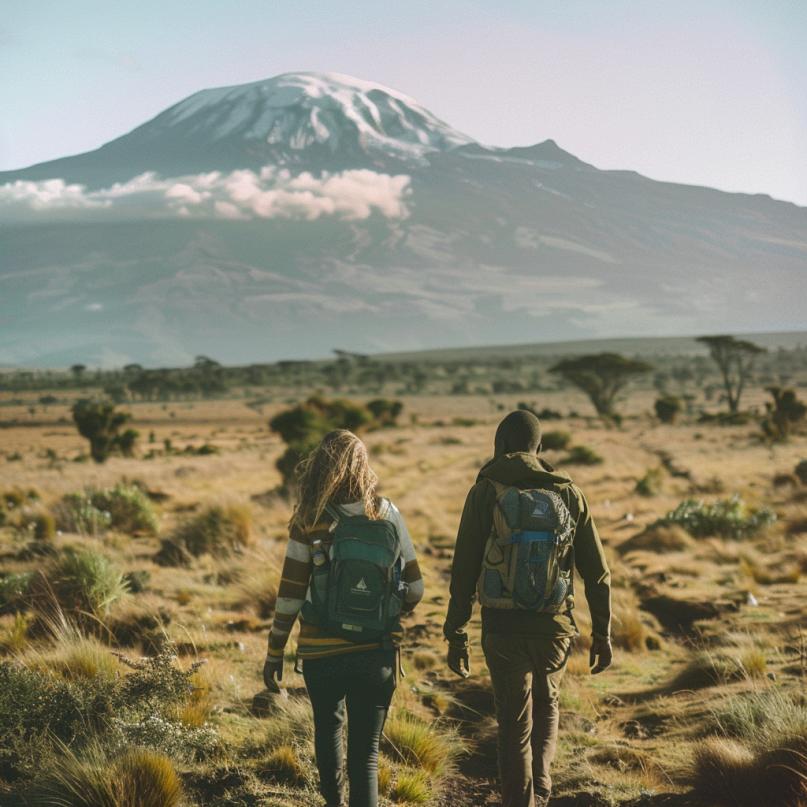


Welcome to our guide on affordable and delightful date ideas that won’t break the bank! Who says you need to spend a fortune to have a memorable and enjoyable time with your loved one?
In this article, we’ve curated a list of simple yet charming date ideas, each worth $5 to $10, perfect for couples looking to spend quality time together without the hefty price tag. Whether you’re planning a romantic outing or a fun day of adventure, these budget-friendly suggestions offer something for everyone. So, grab your partner’s hand and get ready to embark on unforgettable experiences that will leave you both smiling from ear to ear.


1 1 1
Immerse yourselves in the beauty of nature with a delightful picnic in the park. Pack your favorite snacks, a cozy blanket, and head to your nearest green space for a romantic outdoor meal. Enjoy the tranquility of the surroundings as you indulge in delicious treats and bask in each other’s company. With just a few dollars, you can create a magical moment that will be cherished forever.

Support local farmers and artisans while enjoying a leisurely stroll through a bustling farmer’s market. Sample fresh produce, artisanal cheeses, and homemade goodies as you explore the vibrant stalls together. With a budget of $5 to $10, you can treat yourselves to an array ofdelicious treats while soaking in the lively atmosphere of the market.

3 3 3
Transform your backyard or a nearby park into a cozy outdoor cinema for a romantic movie night under the stars. Set up a projector, hang a white sheet, and snuggle up with blankets and Popcorn as you watch your favorite films together. With just a few dollars for snacks and rental fees, you can create a magical evening filled with love and laughter.

4 4 4
Get creative in the kitchen with a fun cooking or baking session at home. Experiment with new recipes, whip up delicious dishes, and enjoy the satisfaction of creating something special together. Whether you’re making a homemade pizza or baking cookies from scratch, the joy of cooking together is priceless.

5 5 5
Escape the hustle and bustle of the city with a scenic nature hike in the great outdoors. Lace up your hiking boots, pack a picnic lunch, and set off on a picturesque trail hand in hand. Take in the breathtaking views, breathe in the fresh air, and savor the serenity of nature as you bond with your partner on this unforgettable adventure.

These are just a few of the affordable and delightful date ideas waiting for you to explore. Whether you’re enjoying a romantic picnic in the park or embarking on a scenic nature hike, these budget-friendly experiences are sure to create lasting memories and strengthen your bond with your loved one. So, don’t let a tight budget hold you back from enjoying quality time together. With a little creativity and ingenuity, you can plan the perfect date without spending a fortune.
Africanproverb
As you embark on your romantic journey, remember that authenticity, kindness, and respect are the cornerstones of meaningful connections.
Embrace the adventure with an open heart and a spirit of curiosity, knowing that every encounter is an opportunity for growth, discovery, and connection. May these tips be the beginning of a beautiful journey filled with laughter, romance, and endless possibilities..


Do you have a story waiting to be told? Is there someone you know whose experiences deserve recognition? We believe every voice has a story worth sharing, and we want to hear yours.
People of Africa Magazine invites you to contribute to our vibrant community of storytellers. Each season, we curate four issues that capture the diverse narratives, rich cultures, and inspiring journeys across the African continent.
Whether it's a personal journey, a community initiative, or an extraordinary achievement, your story could inspire, motivate, or enlighten others. We welcome contributions from writers, photographers, artists, and anyone passionate about storytelling.
Editor-in-Chief Honeymoon Aljabri and the entire team are dedicated to amplifying voices and celebrating the essence of Africa. We want you to be part of this enriching experience.
To share your story or nominate someone whose narrative deserves a spotlight, please contact us via:
Phone: +1-202-977-7175
WhatsApp: [+1-202-977-7175]